Hand-Picked Top-Read Stories
Why you should or shouldn’t get a phd, what is self-plagiarism and how can you avoid it, what’s the difference between a dissertation and a thesis, trending tags, best mathematics online phd programs, table of contents hide, is a mathematics phd lucrative in the job market, examples of positions you can hold with a phd in mathematics, 1. university of wyoming: online phd in mathematics education, 2. bircham international university: doctor – mathematics, 3. the university of wolverhampton: phd postgraduate research in computing and mathematics, 4. edith cowan university: online mathematics phd, 5. university of sussex: mathematics phd.
A PhD in Mathematics is the highest academic degree that one can earn in the field of mathematics. The program normally takes four to five years on average, and it includes both coursework and research components. Students who earn a PhD in Mathematics typically go to excel at the highest level of careers such as professors or researchers at universities or other research institutes. The degree can also be beneficial for those who wish to work in the private sector, as many businesses value employees with advanced mathematical skills.
The quality of an online PhD in Mathematics is largely the same as a traditional on-campus PhD mathematics program, only that the online version can be completed entirely online. Students in the program complete most of the coursework and research with no need to attend on-campus classes, safe for a few meetings here and there depending on the university’s planning. The mathematics online PhD program is designed for those who want to earn their doctorate while continuing with their full-time commitments.
Yes. A PhD in Mathematics can be very lucrative in the job market today as many businesses and organizations value individuals with this type of advanced training and education. Professionals with a PhD in Mathematics often find employment in academia, research, or government. They may also work as consultants or private tutors. The earning potential for achievers with a PhD in Mathematics is very high. In fact, many individuals with this type of doctorate degree earn six-figure salaries these days.
This program will essentially widen your career opportunities, both in academics, public and private sectors. In the case of academia, you will spend your career first as a student and then as a professor teaching about your passion. Government organizations and private companies also offer plenty of opportunities for math PhD holders.
According to Glassdoor , the base annual pay for Math PhD holders in the USA, for example, is around 72,568 US dollars, with additional compensation of 23,614 US dollars, totaling 96,182 US dollars. However, the pay varies depending on several factors, including industry, years of experience, and location.
The US Bureau of Labor Statistics predicts that the demand for statisticians and mathematicians will increase by 31 percent over the next decade. The bureau predicts about 4,100 openings each year during this period.
One valuable benefit of a PhD mathematics program is that it allows you to pursue a very wide range of career options. This can be attributed to the fact that the core principles of mathematics, to a large extent, support all sciences.
The most common career paths for PhD in Mathematics holders are education, finance, scientific research, information and communication, government, and manufacturing.
Graduates of this program can easily thrive in following positions which also happen to be the most common.
- University tutor or professor: Most PhD in math holders end up teaching undergraduate students in the university. PhD students gain connections while studying and researching, and end up teaching in the same university. This path is also ideal for maths PhD online students that prefer to continue focusing on mathematical concepts and theories as part of their career. As a tutor or professor, one is responsible for imparting mathematical knowledge to students and conducting research in the field.
- Researchers: Some pursue careers as postdoctoral researchers at universities, private companies, or government agencies. This is a popular route because it provides opportunities for undertaking research, supervising others, collaborative work, and attending conferences.
- Finance: An online PhD in math program equips you with excellent analytical skills; hence, most mathematics PostDocs find a career in finance. This career path involves working with significant players in the financial world with specific job titles such as Risk Modeler, Investment Analyst, or Actuarial Analyst.
The table below shows a list of some of the top positions in this field alongside the corresponding median salaries.
Please note that these median salaries are not cast in stone. They keep changing from time to time, mostly upwards.

The best Mathematics Online PhD programs
Not all universities that offer a PhD in Mathematics have brought this program online. So this selection is only based on a comprehensive analysis of the universities that are already offering PhD mathematics programs online. Most importantly, e-learning is now embraced widely and any university that is yet to roll-out this new normal will comply sooner or later.
There is even more good news: It’s emerging that the number of students pursuing online learning programs is on the rise. In fact, the United States e-Learning market alone is expected to grow at a CAGR of 12 percent and reach 21.64 billion US dollars in the next few years. This growth plays a revolutionary role that will eventually tilt the higher learning ecosystem and influence many if not all universities and colleges to bring their courses online. Given the way the digital shift has already disrupted even the most rigid industries like manufacturing, it’s only a matter of time before we see a complete disruption across the education sector.
It’s important to note that some online mathematics PhD programs may offer limited topics, research, and dissertation scopes compared to campus-based programs. However, this does not make such programs inferior to the on-campus alternatives. All you need to do is find a program that meets your desires in terms of the career path you would like to pursue.
Here now are the best programs for an online PhD in Mathematics:
The University of Wyoming is a reputable institution that is ranked highly among the best universities by the US News and World Report . It offers online and on-campus bachelor’s, master’s, and doctoral programs.
The Online PhD in Mathematics Education program focuses on mathematical modeling, qualitative research, quantitative reasoning, associated geometry, and differential equations. Students of this program must also complete a preliminary exam and dissertation research in order to be considered for graduation.
Once you complete this online math PhD program, you can pursue a career as a math doctorate advisor, mathematics professor, or elementary education specialist. You can also work in the corporate world or government.
This PhD maths online program takes three years and is accredited by the Higher Learning Commission.
The program’s admission requirements include:
- Master’s degree
- GRE scores: 151 (verbal), 144 (quantitative), and 4.0 for analytical writing
- Three years of P-12 teaching or equivalent relevant professional experience
- Letter of intent, resume, scholarly writing sample, and three letters of recommendation.
- Online application
- Interview with program faculty
Intake dates are as follows:
Spring start
- Applications are due by September 1st
- Review of application completed on October 15th
- Communication of admissions by November 15th
Summer/ Fall start
- Applications are due by February 1st
- Review of application completed on March 15th
- Communication of admissions by April 15th
Bircham International University is committed to fulfilling the needs of students who prefer not to attend traditional on-campus classes. It offers online bachelor’s, master’s, and doctoral degree programs, as well as continuing professional and education diplomas.
The Doctor – Mathematics program evaluates the application of mathematics as a tool for scientists and engineers. It covers geometry, arithmetic, calculus, algebra, trigonometry, set theory, differential equations, and other mathematical topics.
This doctorate in mathematics program is divided into text book and thesis sections. The textbook portion is the largest and constitutes 70 percent whereas the thesis component contributes 30 percent of the program.
Admission requirements include:
- A master’s degree or an international equivalent with five years of study
- Copies of transcripts or relevant documents
- Curriculum Vitae
- ID card or passport
- Filled-out application form
- One ID-sized photo
Students can also transfer credits from other institutions as long as they are recognized by the university.
All the Bibliography books that students will need for the program are covered by the program fees and the University will send these books physically to the address given by the student. The books take anywhere between two to five weeks to arrive depending on your location.
Some of the sources and networks that students will be able to access include the American Mathematical Society, Association of Mathematics Teacher Educators, European Mathematical Society, and the International Council for Industrial and Applied Mathematics among many others. These are all credible bodies, demonstrating the extent to which the university goes to ensure that students get the very best of mathematical knowledge at the highest level.
The University of Wolverhampton is committed to helping graduates and students thrive locally and beyond. It works closely with businesses in supporting development and innovation with forward-thinking talent.
The PhD Program takes four years under the supervision of academics who are high achievers in their area of expertise. The school of Computer Science and Mathematics prides itself on its unwavering support to research students in their PhD journey.
PhD research students have the opportunity to develop research skills by participating in training events organized by the faculty and the university’s doctoral college.
Here are the essential entry requirements:
- First or upper second class degree
- Masters degree
- Evidence of learning or practice that is acceptable by the Dean of Research
The program takes students through two important stages once the student is officially registered. The first stage is known as Progression, where students are required to prepare and submit a summary of their achievements through this period which takes 18 months. Additionally, they need to outline their research plans for the remaining part of the program. This paper should also be presented orally in a workshop format. The final stage is the Examination which is based on the thesis plus an oral examination.
Edith Cowan University (ECU) is a top public institution in Australia offering undergraduate and postgraduate programs. The university understands the different work arrangements, learning styles, locations, and family responsibilities and thus offers loads of online programs to help balance education and other commitments.
The Online Mathematics PhD concentrates on operations research, mathematical modeling, geostatistical modeling, bayesian statistics and modeling, and biostatistics.
The university offers state-of-the-art commuting facilities and emphasizes collaboration with government agencies, the private sector, and non-profit organizations. This program takes a duration of four years.
Entry requirements include:
- Master’s degree in research
- First class or upper second class bachelor’s degree
- Demonstrated capacity to conduct original PhD-level research
- English competency test
The University of Sussex is a top public research university in the United Kingdom. It was established in 1959 and received its royal charter in 1961. It offers high-class education to over 20,000 students representing more than 140 nationalities.
This Mathematics PhD program covers applied and theoretical mathematics, including geometry and topology, differential equations, mathematical biology, mathematical physics, probability and statistics, scientific computing, and numerical analysis.
The program takes four years for full-time and six years for part-time students. Applicants should submit their applications one month before the start date for UK students and three months before for international students.
Admission requirements:
- Master’s degree with 60% merit overall
- Upper second class undergraduate degree
- English proficiency test for International students
The program’s alumni describe it as the most challenging and rewarding experience. The supervisors are exceptional, which makes a significant contribution to the overall quality of the program as supervisors will always be a key element of any PhD program.
Most professionals agree that mathematics is not just any other field of study, it’s among the most important subjects that in fact acts as a foundation for many other areas of study. A PhD in mathematics, therefore, takes your scholarly value to the pinnacle of this most respected subject.
While demanding, a PhD in Mathematics is not just another degree to add to your resume. It’s a sign that you have mastered one of the most difficult and challenging fields of study. And the fact that students can pursue this competitive program online has made it not only easily accessible but also reasonably affordable for all ambitious mathematicians no matter their geographical location in the world.

PHD in Economics, Associate Professor, Department of Business Process Management, Faculty of Market Technologies IOM

Alternatively, use our A–Z index
Attend an open day
Discover more about postgraduate research
PhD Pure Mathematics / Overview
Year of entry: 2024
- View full page
The standard academic entry requirement for this PhD is an upper second-class (2:1) honours degree in a discipline directly relevant to the PhD (or international equivalent) OR any upper-second class (2:1) honours degree and a Master’s degree at merit in a discipline directly relevant to the PhD (or international equivalent).
Other combinations of qualifications and research or work experience may also be considered. Please contact the admissions team to check.
Full entry requirements
Apply online
In your application you’ll need to include:
- The name of this programme
- Your research project title (i.e. the advertised project name or proposed project name) or area of research
- Your proposed supervisor’s name
- If you already have funding or you wish to be considered for any of the available funding
- A supporting statement (see 'Advice to Applicants for what to include)
- Details of your previous university level study
- Names and contact details of your two referees.
Programme options
Programme description.
The The Department of Mathematics has an outstanding research reputation. The research facilities include one of the finest libraries in the country, the John Rylands University Library. This library has recently made a very large commitment of resources to providing comprehensive online facilities for the free use of the University's research community. Postgraduate students in the Department benefit from direct access to all the Library electronic resources from their offices.
Many research seminars are held in the Department on a weekly basis and allow staff and research students to stay in touch with the latest developments in their fields. The Department is one of the lead partners in the MAGIC project and research students can attend any of the postgraduate courses offered by the MAGIC consortium.
For entry in the academic year beginning September 2024, the tuition fees are as follows:
- PhD (full-time) UK students (per annum): Band A £4,786; Band B £7,000; Band C £10,000; Band D £14,500; Band E £24,500 International, including EU, students (per annum): Band A £28,000; Band B £30,000; Band C £35,500; Band D £43,000; Band E £57,000
- PhD (part-time) UK students (per annum): Band A £2393; Band B £3,500; Band C £5,000; Band D £7,250; Band E 12,250 International, including EU, students (per annum): Band A £14,000; Band B £15,000; Band C £17,750; Band D £21,500; Band E £28,500
Further information for EU students can be found on our dedicated EU page.
The programme fee will vary depending on the cost of running the project. Fees quoted are fully inclusive and, therefore, you will not be required to pay any additional bench fees or administration costs.
All fees for entry will be subject to yearly review and incremental rises per annum are also likely over the duration of the course for Home students (fees are typically fixed for International students, for the course duration at the year of entry). For general fees information please visit the postgraduate fees page .
Always contact the Admissions team if you are unsure which fees apply to your project.
Scholarships/sponsorships
There are a range of scholarships, studentships and awards at university, faculty and department level to support both UK and overseas postgraduate researchers.
To be considered for many of our scholarships, you’ll need to be nominated by your proposed supervisor. Therefore, we’d highly recommend you discuss potential sources of funding with your supervisor first, so they can advise on your suitability and make sure you meet nomination deadlines.
For more information about our scholarships, visit our funding page or use our funding database to search for scholarships, studentships and awards you may be eligible for.
Contact details
Our internationally-renowned expertise across the School of Natural Sciences informs research led teaching with strong collaboration across disciplines, unlocking new and exciting fields and translating science into reality. Our multidisciplinary learning and research activities advance the boundaries of science for the wider benefit of society, inspiring students to promote positive change through educating future leaders in the true fundamentals of science. Find out more about Science and Engineering at Manchester .
Programmes in related subject areas
Use the links below to view lists of programmes in related subject areas.
- Mathematics
Regulated by the Office for Students
The University of Manchester is regulated by the Office for Students (OfS). The OfS aims to help students succeed in Higher Education by ensuring they receive excellent information and guidance, get high quality education that prepares them for the future and by protecting their interests. More information can be found at the OfS website .
You can find regulations and policies relating to student life at The University of Manchester, including our Degree Regulations and Complaints Procedure, on our regulations website .
- MyU : For Students, Faculty, and Staff

Mathematics PhD program
#17 U.S. News & World Report ranking
Pursue your passion for math through the University of Minnesota’s PhD in Mathematics program.

Full range of mathematics
With research spanning the complete spectrum of mathematics, our 60+ faculty have the expertise to help you maximize your potential. Our faculty:
- Give students a broad understanding of all areas of mathematics.
- Serve as mentors and guides to support your individual research pursuits.
- Conduct cutting-edge research.
- Hold national and international leadership positions.
Faculty research
A flexible, customizable program
Our program allows students to focus in pure or applied mathematics.
You'll design a program with your faculty advisor to create a curriculum that best suits your needs and goals.
If you enter the program without a prior graduate degree, you'll earn a Master's on the way to your PhD.
Degree requirements

Supportive community
Our active, close-knit community helps students grow and flourish.
You’ll have abundant opportunities to:
- Receive support from mentors, advisors, peers, and alumni.
- Get involved.
- Interact with other students.
- Student groups
Dynamic urban environment
We’re situated on a sprawling campus, surrounded by vibrant urban neighborhoods. The Minneapolis-St. Paul area is known for its:
- Lively scene for dining, culture, arts, and recreation.
- Abundant trails, parks, and waterways, including several lakes and the Mississippi River.
- High quality of life.
- Thriving economy that features a diverse mix of industries and ample opportunities for graduates.
Tuition, benefits, and financial assistance
Our PhD program is fully funded. Everyone we accept receives an offer of financial support, usually in the form of a teaching assistantship.
Financial support
Tuition, fees, and benefits: U of M graduate programs
Applications are due December 15.
How to apply
- Future undergraduate students
- Future transfer students
- Future graduate students
- Future international students
- Diversity and Inclusion Opportunities
- Learn abroad
- Living Learning Communities
- Mentor programs
- Programs for women
- Visit, Apply & Next Steps
- Information for current students
- Departments and majors overview
- Departments
- Undergraduate majors
- Graduate programs
- Integrated Degree Programs
- Additional degree-granting programs
- Online learning
- Academic Advising overview
- Academic Advising FAQ
- Academic Advising Blog
- Appointments and drop-ins
- Academic support
- Commencement
- Four-year plans
- Honors advising
- Policies, procedures, and forms
- Career Services overview
- Resumes and cover letters
- Jobs and internships
- Interviews and job offers
- CSE Career Fair
- Major and career exploration
- Graduate school
- Collegiate Life overview
- Scholarships
- Diversity & Inclusivity Alliance
- Anderson Student Innovation Labs
- Information for alumni
- Get engaged with CSE
- Upcoming events
- CSE Alumni Society Board
- Alumni volunteer interest form
- Golden Medallion Society Reunion
- 50-Year Reunion
- Alumni honors and awards
- Outstanding Achievement
- Alumni Service
- Distinguished Leadership
- Honorary Doctorate Degrees
- Nobel Laureates
- Alumni resources
- Alumni career resources
- Alumni news outlets
- CSE branded clothing
- International alumni resources
- Inventing Tomorrow magazine
- Update your info
- CSE giving overview
- Why give to CSE?
- College priorities
- Give online now
- External relations
- Giving priorities
- Donor stories
- Impact of giving
- Ways to give to CSE
- Matching gifts
- CSE directories
- Invest in your company and the future
- Recruit our students
- Connect with researchers
- K-12 initiatives
- Diversity initiatives
- Research news
- Give to CSE
- CSE priorities
- Corporate relations
- Information for faculty and staff
- Administrative offices overview
- Office of the Dean
- Academic affairs
- Finance and Operations
- Communications
- Human resources
- Undergraduate programs and student services
- CSE Committees
- CSE policies overview
- Academic policies
- Faculty hiring and tenure policies
- Finance policies and information
- Graduate education policies
- Human resources policies
- Research policies
- Research overview
- Research centers and facilities
- Research proposal submission process
- Research safety
- Award-winning CSE faculty
- National academies
- University awards
- Honorary professorships
- Collegiate awards
- Other CSE honors and awards
- Staff awards
- Performance Management Process
- Work. With Flexibility in CSE
- K-12 outreach overview
- Summer camps
- Outreach events
- Enrichment programs
- Field trips and tours
- CSE K-12 Virtual Classroom Resources
- Educator development
- Sponsor an event
Online Math Classes
MIT Mathematics currently offers several online math courses through the edX platform. Each courses is offered as a synchronous course with deadlines and support from TAs on the discussion forum.
Browse MIT Mathematics Courses on edX
How much do these courses cost?
Answer: These courses are free. However, you can choose to pay between $50-100 to earn a verified certificate.
Do I get MIT credit?
Answer: No. You can earn a verified certificate, but you do not get an MIT transcript.
However, if you are admitted to MIT, completing the calculus series or differential equations series will prepare you for the on campus advanced standing exam . If you pass the advanced standing exam on campus, you will receive credit for these courses on your transcript.
Do I get credit at other universities?
Answer: Maybe someday. But not today.
If you take our calculus series, and you are a high school student, you can take the AP Calculus exam to prove that you have learned calculus to a degree required by most colleges and universities.
How can I share my success in an MIT math online course from edX?
Answer: If you choose to purchase a verified certificate, you can post your certificate on your LinkedIn profile.
2024 Best Online PhD in Mathematics [Doctorate Guide]
Earning a math PhD can be beneficial for many different professional paths. A doctorate in mathematics will encourage you to explore the boundaries of math, and you’ll conduct research in addition to coursework.

Additionally, some programs ask students to complete a thesis or dissertation to earn the title of Doctor of Mathematics.
Editorial Listing ShortCode:
Read on to learn more about what a doctorate degree in mathematics entails and determine if it’s the right path for you.
Online Math PhD Programs

Earning a PhD in Mathematics can be an exciting step for many students. This advanced degree is typically sought out by those who wish to dive deeper into mathematical processes, theory, and research.
Students who earn the title of Doctor of Mathematics are often prepared for a variety of advanced roles in education, STEM fields, and data science and management. In addition to completing core classes, you’ll typically have the opportunity to take courses and complete research that help you complete your dissertation.
A dissertation is often linked to potential career and professional opportunities and studies. Many math PhD programs provide a variety of specialty areas to help students hone in on their area of expertise. Those who graduate with a doctorate degree in mathematics pursue careers in a variety of fields, depending on their area of expertise and research.
Graduates’ advanced skills in understanding numeric principles and mathematical reasoning are applicable to a variety of roles, such as:
- Actuarial analyst or financial strategist for businesses
- Academic leader or postsecondary professor
- Government agency consultant or advisor
- Researcher in STEM fields
A highly developed understanding of mathematics, research, theory, and their applications can be beneficial in a variety of professional settings. Pursuing a math PhD can help you fine-tune your skills and grow your professional qualifications in this lucrative field.
Math Careers & Salaries
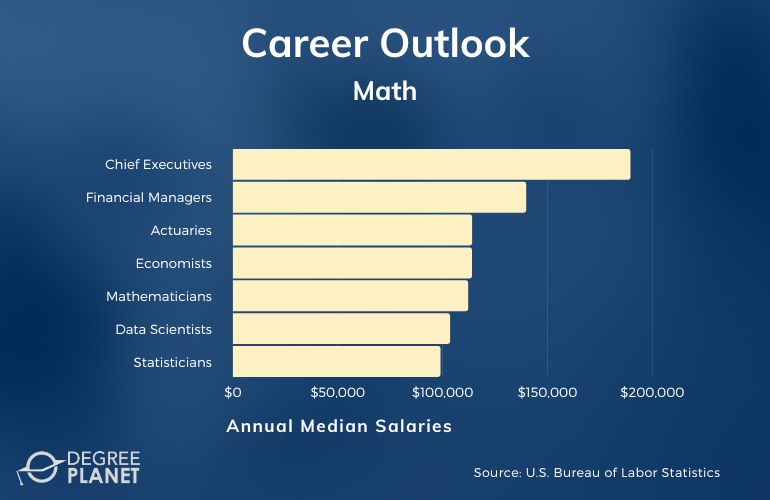
Individuals who have earned a PhD in Math often select careers that exercise their skills in reviewing numbers, outcomes, and analyzing information. Many math professionals with a PhD combine their interests with fields such as physics, engineering, or finance.
According to the Bureau of Labor Statistics , here are the median salaries for various careers related to advanced studies in mathematics.
Some mathematics professionals work as analysts, actuaries, or economists, working with businesses or government entities to review figures and review outcome probability. Others pursue work as professors, researchers, or leaders within postsecondary education.
Mathematicians and statisticians are often employed in a variety of fields where an in-depth knowledge of these topics can be important. These fields can include energy production and mining, aerospace and transportation, finance, or pharmaceutical production.
Mathematics Doctorate Curriculum & Courses

While each school offering a doctorate degree in mathematics will have its own unique curriculum, students will typically encounter courses that encourage their growth.
Some courses that you may encounter while studying for your math PhD include:
- Linear Algebra : This course involves the process of plotting mathematical problems via vectors and matrices.
- Ordinary and Partial Differential Equations : In this course, you’ll solve for unknown variables and their derivatives.
- Probability : At the doctorate level, you’ll take this study of likelihood and chance to a more in-depth, theoretical stage.
- Geometry and Topology : This course compares the local and global implications of continuous and discrete moduli, and it explores topics such as Riemannian geometry and homotopy theory.
- Harmonic Analysis : Using the Fourier transform and Fourier series, you’ll explore functions and frequency.
- Estimation Statistics : Students will combine a variety of factors to create and conduct experiments that allow them to analyze incomplete data.
- Graph Theory : This course provides the opportunity to study graphs and the relationship of multiple pieces of data to each other.
- Mathematical Analysis : In this course, you’ll use both real and complex numbers to explore scenarios involving continuous and analytic functions, limits, infinite sequences, and other mathematical objects.
- Algebraic Combinatorics : Students will explore enumeration, permutation, partitions, sets, and cycles to investigate the world of abstract algebra.
- Operator Theory : This course involves a deep dive into linear operators on function spaces, including the study and analysis of various operators.
Your interests, dissertation, and overall goals will typically influence which courses you choose. It can be beneficial to review each program’s curriculum before you decide on a school.
Admissions Requirements

Each college or university will have its own set of admissions requirements for students applying for their PhD in Mathematics. It’s beneficial to review the application process in full before starting.
Some of the items required by many mathematics doctorate programs include:
- GRE or GMAT Scores (only some schools require them)
- Transcripts of previous education
- Master’s degree in a related field
- CV or resume
- Statement of intent
In addition, you will likely be asked to provide academic writing samples as well as letters of recommendation. You may be asked to complete an interview with department staff, too.
Accreditation
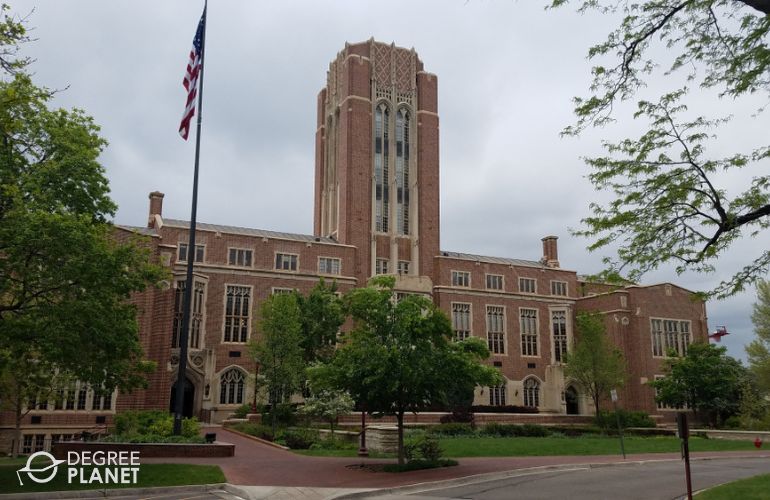
When researching schools that offer a PhD in Math online, you may wish to give special attention to schools that hold regional accreditation.
Accredited schools have been carefully evaluated for their academic precedence. As a result, employers often prefer or require candidates to have received their doctorate in mathematics from an accredited institution. Credible regional accrediting organizations are recognized by the Council for Higher Education Accreditation. You can visit CHEA’s website to verify a school’s accreditation status.
Additionally, benefits such as financial aid, certification, and membership to professional organizations may be tied to earning your doctoral degree from an accredited institution.
Financial Aid and Scholarships

If you are interested in needs-based financial aid, you could fill out and submit the FAFSA, or Free Application for Federal Student Aid . This determines your eligibility for federal financial aid. Most state aid programs want to see your FAFSA results as well.
You could also inquire about scholarship opportunities through the school you choose to attend. Many programs offer financial assistance for students based on prior academic performance, chosen specialty, or demographic factors. Your employer may also offer an educational assistance program, such as tuition reimbursement, for workers who are furthering their education.
In addition, some independent parties, corporations, and communities offer scholarship or grant opportunities for doctoral students. The requirements for these scholarships vary and are often as unique as the gifts themselves.
What Can You Do with an Online PhD in Mathematics?

A Doctor of Mathematics degree is designed for those who wish to complete in-depth research and exploration of the various expressions of mathematics in our world.
Those who earn this degree may wish to work in educational, research-driven, financial, economic, or technological fields. They may also choose to work in a variety of STEM-related fields, in areas such as energy, software, corporate, government, and aerospace.
Common career paths for advanced mathematics professionals include mathematician, statistician, actuary, economist, data scientist, and operations research analyst. Those with a PhD may also pursue teaching or research roles in colleges and universities.
How Long Does It Take to Get a PhD in Math Online?

It often takes between 3 to 5 years of full-time study to complete a PhD program. Your overall timeframe, though, could depend on the program you select and your enrollment status.
In many cases, the number of required credit hours combined with the dissertation process will dictate how long it takes to receive your degree. If a doctorate program does not have a dissertation requirement, a full-time student can typically complete the program in 3 years.
You may wish to compare programs’ course catalogs to understand the program structure and course schedule of each school you’re considering.
What’s the Difference Between Applied Mathematics vs. Mathematics PhD Programs?
There are many similarities between the topics studied in a PhD program in applied mathematics versus a PhD program in mathematics. The area of concentration for each program differs a bit in practice.
In each program, students are able to test theories, produce research, and examine principles, though the motivation and results may vary.
Is a Math PhD Degree Worth It?

Yes, a math PhD degree is worth it for many students. Math professionals can use their skills in a variety of areas, including finance, engineering, technology, education, and business.
According to the Bureau of Labor Statistics, overall employment for math occupations is projected to grow by 29% over the next ten years. This is much faster than the average for all occupations. Common math careers include actuaries, data scientists, mathematicians, statisticians, and operations research analysts. A PhD can also help you qualify for positions in research and academia.
Universities Offering Online Doctorate in Mathematics Degree Programs
Methodology: The following school list is in alphabetical order. To be included, a college or university must be regionally accredited and offer degree programs online or in a hybrid format.

Indiana University – Bloomington offers a Doctor of Education in Curriculum and Instruction with a specialization in Mathematics Education. This degree is intended for individuals who have already obtained a master’s in a related field. The curriculum consists of 60 credits, and courses meet online. It covers topics like teaching methods, mathematical thinking, student assessment, and research skills.
Indiana University – Bloomington is accredited by the Higher Learning Commission.

Montana State University offers a Doctor of Philosophy in Mathematics (Education Emphasis). This program is designed for those who wish to pursue careers in K-12 educational settings. Potential courses include Principles of Mathematical Analysis, Models of Assessment in Mathematics, and Applied Educational Research. The completion of at least 60 credits is required to graduate.
Montana State University is accredited by the Northwest Commission on Colleges and Universities.

The University of Colorado – Denver offers a Doctor of Philosophy in Education and Human Development with a concentration in Mathematics Education. The curriculum is designed to teach the skills required to excel in diverse educational environments. The program utilizes a blend of online and on-campus delivery methods. The program’s 75 required credit hours can typically be completed in 4 to 8 years.
The University of Colorado – Denver is accredited by the Higher Learning Commission of the North Central Association of Colleges and Schools.

The University of Wyoming offers a Doctor of Philosophy in Mathematics Education. This program is designed to prepare students for work as scholar-leaders in settings like research institutions and universities. It can be completed entirely online. The curriculum consists of 81 credit hours and covers key concepts like multicultural education, curriculum development, learning and cognition, and assessment.
The University of Wyoming is accredited by the Higher Learning Commission.
Getting Your PhD in Mathematics Online

In our technological and solution-driven world, the horizons and practical applications of mathematics are expanding daily.
A math PhD program could help you grow your professional qualifications in this lucrative field. Much like with a masters in mathematics online program, earning a PhD in Mathematics online could be a more flexible and convenient format for working professionals. The professional applications of an advanced mathematics degree are diverse. Many graduates use their PhD to advance in research, academia, business, or other areas of industry.
You could start exploring accredited schools today to see which online math PhD programs best align with your interests, schedule, and goals.

Best Accredited Online Ph.D. Programs 2024

AccreditedSchoolsOnline.org is committed to delivering content that is objective and actionable. To that end, we have built a network of industry professionals across higher education to review our content and ensure we are providing the most helpful information to our readers.
Drawing on their firsthand industry expertise, our Integrity Network members serve as an additional step in our editing process, helping us confirm our content is accurate and up to date. These contributors:
- Suggest changes to inaccurate or misleading information.
- Provide specific, corrective feedback.
- Identify critical information that writers may have missed.
Integrity Network members typically work full time in their industry profession and review content for AccreditedSchoolsOnline.org as a side project. All Integrity Network members are paid members of the Red Ventures Education Integrity Network.
Explore our full list of Integrity Network members.
Take our quiz and we'll do the homework for you! Compare your school matches and apply to your top choice today.

A Ph.D., or doctor of philosophy, is the highest level of academic degree that you can attain. Consisting primarily of research, a Ph.D. prepares you for a career in academia or research in the field you study.
Students who choose to pursue a Ph.D. online will find it can be completed in less time. Online students also get the added benefit of being able to complete their work from the comfort of home. The overall cost may also be less compared to an in-person program.
We’ve compiled a list of the best accredited online Ph.D. programs to help you start your search.
Are Online Ph.D. Programs Worth It?
An online Ph.D. program is an ideal choice if you want to balance your career and family responsibilities along with your education.
While there are some preconceived notions that online programs aren’t legitimate, as long as the program you choose is accredited, the degree is the same as one earned in person.
While the annual tuition cost to earn a Ph.D. online averages $12,394 for a public institution and $26,621 for a private university, doctoral graduates enjoy a lower unemployment rate and higher weekly salary than those with less education, according to the Bureau of Labor Statistics (BLS)
Did You Know…
- According to the BLS , workers with a doctoral degree earned a median of $651 more per week than workers with a bachelor’s degree in 2022.
- Doctorate-holders boast some of the lowest unemployment rates at 1%.
- In 2019, research found that 39.8% of graduate students were enrolled in online learning.
- The number of doctorates awarded between 2020 and 2021 dropped by 5.4%.
- Not all Ph.D.-holders end up working in academia.
Top Schools for Online Accredited Ph.D. Programs
Capitol technology university.
- Campus + Online
- In-State $25,830
- Out-of-state $25,830
- Retention Rate 75%
- Acceptance Rate 47%
- Students Enrolled 796
- Institution Type Private
- Percent Online Enrollment 98%
- Accreditation Yes
Clemson University
- In-State $14,118
- Out-of-state $37,110
- Retention Rate 94%
- Acceptance Rate 49%
- Students Enrolled 27,341
- Institution Type Public
- Percent Online Enrollment 49%
Keiser University
- In-State $20,800
- Out-of-state $20,800
- Retention Rate 72%
- Acceptance Rate 96%
- Students Enrolled 19,861
- Percent Online Enrollment 50%
Mississippi State University
- In-State $9,110
- Out-of-state $24,790
- Retention Rate 81%
- Acceptance Rate 76%
- Students Enrolled 23,086
- Percent Online Enrollment 43%
Nova Southeastern University
- In-State $33,510
- Out-of-state $33,510
- Retention Rate 78%
- Acceptance Rate 93%
- Students Enrolled 20,898
- Percent Online Enrollment 52%
Old Dominion University
- In-State $7,029
- Out-of-state $26,664
- Students Enrolled 23,494
- Percent Online Enrollment 76%
Saybrook University
- In-State $0
- Out-of-state $0
- Retention Rate 0%
- Acceptance Rate 0%
- Students Enrolled 915
- Percent Online Enrollment 100%
Texas Tech University
- In-State $8,935
- Out-of-state $21,204
- Retention Rate 85%
- Acceptance Rate 68%
- Students Enrolled 40,542
- Percent Online Enrollment 68%
How We Rank Schools
Accredited Schools Online uses a custom ranking system to evaluate schools on their quality, affordability, and reputation.
We rank schools using factors like graduation rate, admission rate, tuition costs, financial aid, and program offerings. All our ranked schools hold institutional accreditation .
For this page, we created a directory of online accredited Ph.D. programs that meet our criteria. The list is organized alphabetically rather than ranked.
Learn more about how we create school rankings on our methodology page .
Does Accreditation Matter for Online Ph.D. Programs?
A college is accredited after being recognized by an independent institution that verifies the school’s courses and programs meet set quality standards.
The school you choose must be accredited in order for your Ph.D. to be recognized by employers , earn professional licensures, and qualify you for federal financial aid.
Legitimate accreditors are recognized by the U.S. Department of Education and/or the Council for Higher Education Accreditation (CHEA).
How Much Does an Online Ph.D. Cost?
In general, you can expect to pay around $13,000-$30,000 per year in tuition and fees for your online Ph.D.
Several factors affect how much your Ph.D. program will cost, including:
- Whether the program is fully funded
- Whether your school is public or private
- Whether you’re an in-state or out-of-state student
- How long your program lasts (most Ph.D. programs take 5-7 years to complete)
- How much financial aid you get
While many in-person and online doctoral programs in the U.S. are fully funded, these tend to be highly competitive.
One way to save money on your online Ph.D. is to attend a program that offers in-state tuition to residents. Make sure you submit the FAFSA each year so you can secure federal financial aid .
You may also need to budget for occasional travel to and from campus and research sites, especially as you work on your dissertation.
What’s the Difference Between a Ph.D. and a Doctorate?
While a Ph.D. and a doctoral degree, or doctorate, both signify the same level of education completed, their uses are different.
Doctorate is the broader term — a Ph.D. is a type of doctorate. Specifically, a Ph.D. is an academic degree that prepares you for a career in research or teaching in your field of study (such as science, English, or economics).
Besides a Ph.D., other types of doctorates include a doctor of medicine (MD), a doctor of education (Ed.D.), and a doctor of psychology (Psy.D.). These degrees are typically used in either an academic or professional setting.
Online Ph.D. Programs That Don’t Require a Dissertation
A dissertation is a final written project culminating in a student’s original research at the end of their Ph.D. program. A dissertation is typically presented and defended by its author. It’s typically required for degrees with an academic or research focus.
Not all Ph.D. programs require a dissertation. For example, some Ph.D. programs in humanities, education, business administration, and criminal justice require simple or no dissertations for a quicker completion time .
What Jobs Can You Get After Earning an Online Ph.D.?
Once you finish your online doctoral program, you can explore a variety of career paths both within and outside academia.
Many Ph.D. graduates, especially those who studied the humanities, go on to become professors. Other popular roles include administrator, scientist, and psychologist.
Graduates of online Ph.D. programs earn a relatively high average base salary of $105,000 a year, according to Payscale .
Frequently Asked Questions About Online Ph.D. Programs
What is the quickest ph.d. to get.
The quickest Ph.D. to earn are those that award professional degrees and don’t require extensive research projects or dissertations at completion. These Ph.D. programs can include accounting, business, education, and media.
To finish your degree faster, you can also look for accelerated programs that quicken the pace of a program and shorten the time it takes to complete.
Are online doctoral programs legit?
If the online doctoral program is accredited, it is legitimate. Accreditation ensures that the program meets the rigorous educational standards of other comparative doctoral programs.
With accreditation, employers and other institutions of higher learning will recognize your degree. As more universities turn toward online programs to serve a more diverse student population, there are a growing number of legitimate, accredited online Ph.D. programs.
How long are online Ph.D. programs?
Online Ph.D. programs, like any other doctoral program, can vary in length but typically take 5-7 years to complete. A doctoral degree balances coursework with research. Usually, students must meet a certain number of course requirements before they can start original research.
While coursework may take only a year or two, writing a dissertation that meets the program requirements varies from candidate to candidate.
Can I earn my Ph.D. entirely online?
Yes, many accredited colleges and universities offer 100% online Ph.D. programs. That said, some programs may require on-campus experiences, such as library research and a dissertation defense.
What do employers think of online doctoral programs?
It takes a high level of discipline and persistence to obtain a graduate degree, no matter the context. Most employers will recognize and value the hard work it takes to get a Ph.D., whether you completed your doctorate online or in person.
Make sure you research potential programs. If you’re attending an accredited, well-regarded school, employers will value your online Ph.D. just as much as a traditional one.
Note: The insights on this page — excluding school descriptions — were reviewed by an independent third party compensated for their time by Accredited Schools Online. Page last reviewed November 20, 2023.

Online Ph.D. programs provide students with flexible schedules and affordable tuition. Check out the top-ranked programs in this comprehensive guide.

Best Accredited Online Master’s Programs 2024

Best Accredited Online Bachelor’s Degree Programs 2024
Shape your future with an online degree.
Connect with a community of peers, and find a program that will allow you to continue your education in a fast and flexible way.
Our cookies
We use cookies for three reasons: to give you the best experience on PGS, to make sure the PGS ads you see on other sites are relevant , and to measure website usage. Some of these cookies are necessary to help the site work properly and can’t be switched off. Cookies also support us to provide our services for free, and by click on “Accept” below, you are agreeing to our use of cookies .You can manage your preferences now or at any time.
Privacy overview
We use cookies, which are small text files placed on your computer, to allow the site to work for you, improve your user experience, to provide us with information about how our site is used, and to deliver personalised ads which help fund our work and deliver our service to you for free.
The information does not usually directly identify you, but it can give you a more personalised web experience.
You can accept all, or else manage cookies individually. However, blocking some types of cookies may affect your experience of the site and the services we are able to offer.
You can change your cookies preference at any time by visiting our Cookies Notice page. Please remember to clear your browsing data and cookies when you change your cookies preferences. This will remove all cookies previously placed on your browser.
For more detailed information about the cookies we use, or how to clear your browser cookies data see our Cookies Notice
Manage consent preferences
Strictly necessary cookies
These cookies are necessary for the website to function and cannot be switched off in our systems.
They are essential for you to browse the website and use its features.
You can set your browser to block or alert you about these cookies, but some parts of the site will not then work. We can’t identify you from these cookies.
Functional cookies
These help us personalise our sites for you by remembering your preferences and settings. They may be set by us or by third party providers, whose services we have added to our pages. If you do not allow these cookies, then these services may not function properly.
Performance cookies
These cookies allow us to count visits and see where our traffic comes from, so we can measure and improve the performance of our site. They help us to know which pages are popular and see how visitors move around the site. The cookies cannot directly identify any individual users.
If you do not allow these cookies we will not know when you have visited our site and will not be able to improve its performance for you.
Marketing cookies
These cookies may be set through our site by social media services or our advertising partners. Social media cookies enable you to share our content with your friends and networks. They can track your browser across other sites and build up a profile of your interests. If you do not allow these cookies you may not be able to see or use the content sharing tools.
Advertising cookies may be used to build a profile of your interests and show you relevant adverts on other sites. They do not store directly personal information, but work by uniquely identifying your browser and internet device. If you do not allow these cookies, you will still see ads, but they won’t be tailored to your interests.
Course type
Qualification, university name, distance learning phd mathematics.
4 degrees at 3 universities in the UK.
Customise your search
Select the start date, qualification, and how you want to study

Related subjects:
- PhD Mathematics
- PhD General Mathematics
- PhD Operational Research (OR)
- PhD Statistics, Probability and Operational Research

- Course title (A-Z)
- Course title (Z-A)
- Price: high - low
- Price: low - high
PhD Computing and Mathematics
University of wolverhampton.
PhD students at the School of Mathematics and Computer Science are supervised by academics who are leading experts in their particular Read more...
- 4 years Distance without attendance degree: £4,712 per year (UK)
- 4 years Full time degree: £4,712 per year (UK)
- 8 years Part time degree: £2,356 per year (UK)
Operational Research & Logistics PhDs and MPhils (Distance Learning)
University of portsmouth.
If you're ready to take your existing qualifications and expertise in Operational Research and Logistics into a postgraduate research Read more...
- 6 years Distance without attendance degree: £2,356 per year (UK)
Mathematics PhDs and Mphils (Distance Learning)
If you're ready to take your existing knowledge and qualifications in Mathematics into a postgraduate research degree, Portsmouth is the Read more...
PhD in History (by distance learning)
University of york.
Be part of our vision to advance mathematical knowledge and understanding through impactful research. Through our research we aim to create Read more...
- 4 years Distance without attendance degree: £2,393 per year (UK)
- 3 years Distance without attendance degree: £4,786 per year (UK)
- 3 years Full time degree: £4,786 per year (UK)
- 6 years Part time degree: £2,393 per year (UK)
Course type:
- Distance learning PhD
- Full time PhD
- Part time PhD
Qualification:
Related subjects:.

5 Best Grad Schools with Online Doctorate in Math Education
Reviewed by David Krug David Krug is a seasoned expert with 20 years in educational technology (EdTech). His career spans the pivotal years of technology integration in education, where he has played a key role in advancing student-centric learning solutions. David's expertise lies in marrying technological innovation with pedagogical effectiveness, making him a valuable asset in transforming educational experiences. As an advisor for enrollment startups, David provides strategic guidance, helping these companies navigate the complexities of the education sector. His insights are crucial in developing impactful and sustainable enrollment strategies.
Updated: March 13, 2024 , Reading time: 11 minutes
Share this on:

Find your perfect college degree
In this article, we will be covering...
Mathematics teachers seeking advanced knowledge and skills to qualify for leadership and research positions in various academic settings should consider an online doctorate program in mathematics education. This advanced degree program equips professionals with the ability to translate dense mathematics knowledge to students with different levels of understanding.
Doctoral programs prepare graduate students to conduct research on mathematics education at the elementary, secondary, and postsecondary levels.
Online doctorates in math education follow the same mathematics curricula as on-campus doctoral programs. Doctoral students enroll in advanced classes that build on their graduate-level mathematics courses. Advanced courses focus on the study of mathematics teaching, learning, and curriculum development.
Doctor of mathematics education courses equip its holders with the knowledge and credentials to significantly improve mathematics instruction at all levels, from primary to higher education, and to advance the discipline via research and study.
Methodology
Each doctoral program on the Best Online Doctorate in Math Education was listed based on these criteria:
- Offers online/hybrid classes that provide students with the same comprehensive curriculum as residential programs,
- Has a strong alum network capable of providing online students with valuable connections and opportunities,
- Emphasize practical applications of research to help students address challenges in teaching and learning mathematics,
- Provide students with the opportunity to work with an award-winning faculty in doing and publishing research,
- Offers graduate assistantships,
- Obtained regional accreditation to ensure that the program’s content meets standards of quality and that the degree will be recognized and respected by future employers.
Check out our Methodology page for details.
5 Best Online Doctorate in Math Education
University of wyoming.
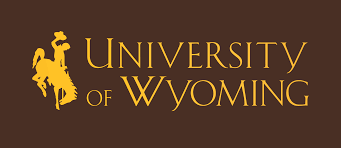
Doctor of Philosophy in Curriculum and Instruction: Mathematics Education
The University of Wyoming’s online Ph.D. in Curriculum and Instruction allows current mathematics teachers to specialize in Mathematics Education.
The doctorate in mathematics curriculum instruction at UW encourages the development of novel approaches and methodologies for producing highly qualified scholar-leaders for the field of mathematics education on a global scale. Students must complete 81 credit hours to earn the degree, which usually takes 3-5 years to complete via online learning.
The mathematics education specialization offers nine distinct concentration courses; students can choose up to 6 courses. Advanced Math Curriculum; Assessment & Evaluation; Colloquium in Mathematics Education; Culture, Power & Identity in Mathematics Education; and Analysis & Critique of Research in Mathematics Education are some concentration courses available.
Upon completing the required online coursework, students must take a preliminary exam, submit a written demonstration of learning outcomes, and present and defend a doctoral dissertation to conclude the degree program.
An accredited institution with a master’s degree is required to apply for the program. All graduate coursework should have a 3.0 or higher GPA. Additional requirements include three years of P-12 teaching experience or its equivalent and GRE scores (minimum of 144 qualitative, 151 verbal, and 4.0 in analytical writing). International students must submit high scores on their TOEFL or IELTS.
University of Indiana Bloomington

Doctor of Education in Curriculum and Instruction: Mathematics Education
Mathematics Education at the University of Indiana Bloomington is offered as a specialization in the EdD in Curriculum and Instruction program. This is a 60-credit hours program designed for working professionals and can be completed in 2-3 years, depending on the student’s pace. Doctoral students will automatically be considered candidates for funding opportunities, which include fellowships and assistantships.
IU Bloomington is known for having an award-winning faculty within all their schools, including the School of Education. Online students will take classes taught by the same on-campus faculty with expertise in mathematics education. Courses of the program explore topics that teach candidates technology integration, mathematical thinking, equitable practices, curriculum development, teacher education, and the use of research methods to improve math education.
Students can design their own degrees by choosing a set of Core Inquiry Courses beyond mathematics education, such as Computer-Mediated Discourse Analysis, Advanced Statistics in Psychology I, and Analysis and Modeling for Public Affairs, among others.
A bachelor’s and a master’s degree with a 2.75 or higher GPA from a regionally accredited institution is required to gain admission to the online program. Students must also submit a personal statement, a resume, and two letters of recommendation. An additional requirement for international students is a 79 minimum TOEFL score or 6.5 minimum on the IELTS.
Texas A&M University

Texas A&M University offers a comprehensive PhD in Curriculum and Instruction in Mathematics Education for educators pursuing advanced graduate programs focused on advancing mathematics classrooms.
This online doctoral degree uses the most recent research findings, classroom technology, online resources, and curricular developments to produce graduates able to compete in the 21st-century classroom. Since this is a research-focused degree, it requires students to create their own research on a current issue related to mathematics education.
This 64-credit hour program consists of foundational courses, advanced mathematics education coursework, and a dissertation on original research. Concentration courses in mathematics education focus on curriculum and development, exploring topics in Early Childhood Mathematics and Science, Teaching and Learning Number and Quantity Concepts, Theories of Learning and Teaching Mathematics, and more. Students can engage in a research-active faculty while exploring their own interests.
PhD students are not required to submit their GRE scores. Admission requirements include departmental essays, resume/vita, reference surveys/letters, and statement of purpose. International students must submit TOEFL scores.
Ohio University

Doctor of Philosophy in Mathematics Education
Designed for math teachers and instructional leaders, Ohio University’s online PhD in Mathematics Education focuses on helping doctoral candidates obtain skills to teach math from kindergartens to college students. PhD students will receive teacher training and professional development internships focused on postsecondary leadership roles.
Candidates must complete a dissertation on a research project focused on solving a current issue in mathematics education. The program has an average completion time of 4-5 years.
As part of the program’s core courses, students will study curriculum and learning theory, social and cultural aspects of education, ethical leadership, and various research methods. The program’s concentration courses include Curriculum in Mathematics Education, Research in Teacher Education, and Mathematics Education Through the Lens of Technology.
Students must consult with the doctoral committee when choosing concentration courses, which helps students make sound decisions when customizing their coursework.
A master’s degree from a reputable institution is a must. Other requirements for admission include a current CV/resume, official undergraduate and graduate transcripts, three letters of recommendation, a goal statement, and an academic writing sample. International students with a minimum of 80 on their TOEFL iBT or 6.5 on their IELTS will be eligible for funding opportunities.
Illinois State University

Illinois State University offers another top-performing doctorate in Mathematics Education. ISU’s Department of Mathematics is known for being one of the country’s top producers of Mathematics Education PhDs, meaning only the best candidates gain admission.
This online PhD in Mathematics Education is a research-focused doctorate that follows the same curriculum as its campus-based program, focusing on developing students’ skills for postsecondary roles.
This is a 90-hour program that can be completed in 3 to 4 years of full-time study past the student’s master’s degree. In addition to content and core courses, research methodology, and professional projects, students must satisfy the program’s residency requirement that promotes experiences in teaching, research, and engagement with a community of scholars.
Students can tailor their degrees by choosing an elective in mathematics, curriculum, technology, educational psychology, human development, evaluation, supervision, learning theory, or measurement.
Students must have a master’s or specialist degree in education or mathematics to qualify for the online program. ISU also requires applicants to have a 3.0 GPA or higher for all attempted graduate-level coursework and in the last 60 hours of undergraduate work.
Additional requirements include three letters of recommendation, official GRE scores, and unofficial transcripts. International applications are also accepted.
Most Common Math Education Careers
Math department head/chair.
These professionals oversee the mathematics department in a college, university, or high school. Responsibilities include recruiting faculty, creating budgets, providing financial assistance, and performing other administrative duties.
Average Annual Salary: $74,992
Supervisor/Coordinator of Mathematics
As a supervisor/coordinator of mathematics, you’re responsible for supporting math teachers through organizing training and professional development programs. Additional responsibilities include planning, implementing, and aligning the curriculum with current academic standards.
Average Annual Salary: $66,490
Curriculum Supervisor of Mathematics
As a curriculum supervisor, your primary duty is to design, evaluate, and update mathematics curricula in an educational setting to ensure and support student learning outcomes. Other responsibilities entail collaborating with teachers, administrators, and curriculum specialists to improve instructional materials.
Average Annual Salary: $93,000
Postsecondary Math Educator
As a postsecondary teacher, you will play an essential role in shaping the future of mathematics education. You’ll provide instruction, guidance, and support to students pursuing degrees or courses in mathematics or related fields.
Average Annual Salary: $80,840
Math Education Resources and Organizations
National council of teachers of mathematics (nctm).
NCTM is one of the most prominent organizations dedicated to math education. It offers math teachers materials, guidelines, publications, and chances for professional growth.
American Mathematical Association of Two-Year Colleges (AMATYC)
AMATYC represents math professors and administrators in two-year colleges. It promotes enhancing mathematics instruction at two-year institutions and provides access to resources, chances for professional growth, and a venue for networking and collaboration.
National Council of Supervisors of Mathematics (NCSM)
Devoted to assisting current and future leaders in mathematics education, NCSM provides tools and opportunities for professional learning for math supervisors. It aims to raise student achievement and mathematics instruction through good leadership.
Association of State Supervisors of Mathematics (ASSM)
State-level administrators are best to obtain membership from ASSM. This organization focuses on enhancing professional development, policy, and practices in mathematics education. They provide state-level forums for mathematics supervisors, fostering networking and best practices.
Association of Mathematics Teacher Educators (AMTE)
AMTE’s top priority is the professional advancement of mathematics teacher educators. This organization offers training and assistance to math educators at all levels. It provides tools, conferences, and publications to improve the standard of mathematics teacher education.
TODOS: Mathematics for ALL
TODOS promotes inclusivity and diversity in mathematics instruction. It supports educators seeking to meet the needs of all kids in mathematics by offering resources, research, and assistance.

Frequently Asked Questions
Are online doctoral degrees respected.
Accredited online doctorates are acknowledged and respected in the workplace. Online doctorates are rising in numbers and are gaining popularity for offering the same academic rigor as their on-campus counterpart.
Are online Math education Doctorates hard to complete?
Online doctorates require excellent time management skills and self-discipline. Similar to an on-campus program, online math education doctorates require students to complete advanced courses, create their own research, and present and defend a dissertation. However, since the study schedules of online students are more flexible, they may be tempted to put off or fall behind.
How long does it take to earn a Doctor of Mathematics education online?
The duration of a program depends on several factors, including the student and the program’s pacing, the required credit hours, and the student’s transfer credits. PhDs take longer than EdDs and have an average time-to-degree of 5 years. EdD students can often complete the program in 3 years.
What will I study in an online Doctor of Mathematics education?
The most common topics in advanced mathematics education degrees include theory, mathematics curriculum and instruction, educational leadership and policy, equity and inclusion in mathematics education, technology in mathematics education, and assessment and evaluation.
Key Takeaways
- Due to its flexibility, online doctorates in mathematics education require a high level of self-discipline and time management.
- Online doctor of mathematics education covers highly technical topics and compromises core and concentration courses, research, and dissertations.
- Graduates of online mathematics education doctorates qualify for lucrative post-secondary education, research, or administration positions.
Additional Resources:
- Best Grad Schools with Online Doctorate in Special Education
- Best Online Master’s of Arts In Special Education Graduate Schools
- Best Grad Schools with Online Doctorate in Science Education
Related Posts

We’re certain of one thing—your search for more information on picking the best graduate degree or school landed you here. Let our experts help guide your through the decision making process with thoughtful content written by experts.
Mathematics Education PhD
Doctor of philosophy.
The Doctor of Philosophy (Ph.D.) degree emphasizes research competencies. The degree requires a scholarly dissertation of intellectual merit and sound research methodology. Dissertation research may include analytical studies of the process of teaching or experimental studies of the teaching-learning process, including studies of verbal learning and laboratory practice or historical studies.

Admissions Information
Displaying requirements for the Spring 2024, Summer 2024, and Fall 2024 terms.
- Points/Credits: 75
- Entry Terms: Spring, Summer, Fall
Application Deadlines
For details about rolling deadlines , visit our admission deadlines page.
Select programs remain open beyond our standard application deadlines , such as those with an extended deadline or those that are rolling (open until June or July). If your program is rolling or has an extended deadline indicated above, applications are reviewed as they are received and on a space-available basis. We recommend you complete your application as soon as possible as these programs can close earlier if full capacity has been met.
Application Requirements
Requirements from the tc catalog (ay 2023-2024).
Displaying catalog information for the Fall 2023, Spring 2024 and Summer 2024 terms.
View Full Catalog Listing
Doctoral Degrees
All candidates for the Ed.D., Ed.D.C.T., or Ph.D. degrees are expected to demonstrate both mathematics and mathematics education competencies through a series of certification examinations taken upon the completion of 60 graduate points. Certification examinations test the student’s knowledge of current research and theory in mathematics education and mathematics content. Examinations are offered once in the fall, spring, and summer terms. Courses recommended as preparation for the examinations in mathematics education include MSTM 6037, MSTM 4019, and other mathematics education courses; Courses recommended as preparation for the examinations in mathematics are 6000- level mathematics content courses.
Students must demonstrate acceptable proficiency in at least three of the following six mathematics content areas: algebra, analysis, discrete mathematics, foundations of mathematics, geometry and topology, and probability and statistics. Students may sit for the examination in mathematics content during the regular certification examination times. Alternatively, they may register for advanced content courses and, with permission of the program, sit for the content area certification examination upon completion of the course. Incoming doctoral candidates should register for MSTM 6037 Professional Seminar in Mathematics during the first year of doctoral studies.
Doctoral students whose dissertations require statistical analysis should include appropriate statistics courses in their programs. These points can be included either in the mathematics/mathematics education requirement or can be taken as research electives.
Doctor of Philosophy in Mathematics Education
The Doctor of Philosophy (Ph.D.) degree emphasizes research competencies. The degree program requires a scholarly dissertation of intellectual merit and sound research methodology. Dissertation research may include analytical studies of the process of teaching or experimental studies of the teaching-learning process, including studies of verbal learning and laboratory practice or historical studies.
Candidates are encouraged to develop an association with a faculty member early in their studies to identify a problem area of mutual interest to plan a course of studies that leads to the competencies needed to complete dissertation research and prepare for a professional role. Further details are available in the brochures on doctoral studies and in the general descriptions of doctoral programs available from the Office of Doctoral Studies (ODS).
A program of study for the Doctor of Philosophy degree must include at least 45 points taken under Teachers College registration. In order to permit the acquisition of broad and basic scholarship, each program of study should include at least 60 points in mathematics, mathematics education, statistics, and computing. At least 35 points should be in advanced courses – including research courses (MSTM 6500 or 6501 and MSTM 7500). (Any Teachers College course at the 6000 level or above, any Columbia University Graduate School of Arts and Sciences course with a “G” prefix, any “W” course numbered above 4000, or any transferred course with a graduate-level prerequisite will be considered an advanced course.) Further, 15 points in the philosophical, psychological, and curricular foundations of education must be included in every Ph.D. degree program. Students whose dissertations require statistical analysis should include appropriate statistics courses in their programs. These points can be included either in the mathematics/mathematics education requirement or can be taken as research electives.
Candidates for the Ph.D. degree are required to demonstrate competency in two languages chosen from among French, German, and Russian. Students who require other languages for the preparation of their dissertation may petition the program to request one substitution. Students in mathematics may not use computer languages or statistics to satisfy the language requirement.
The Ph.D. dissertation is a scholarly study contributing new theoretical knowledge to the field and should be planned early in the program when sufficient advanced courses have been completed to permit the candidate to enroll in relevant research courses. Ph.D. dissertations in mathematics education should be (1) experimental studies in learning, (2) analytical studies in policy theory in mathematics education, or (3) other scholarly investigations of problems and issues of broad significance in the field.
The website of the Program offers a list of Topic study groups which doctoral students are recommended to join.
- View Other Degrees
Program Director : Professor Alexander Karp
Teachers College, Columbia University 323 Thompson
Phone: (212) 678-3381 Fax: (212) 678-8319
Email: tcmath@tc.edu
Fariborz Maseeh Department of Mathematics + Statistics
MASEEH DEPARTMENT OF MATHEMATICS + STATISTICS
PhD Mathematics Education
The main objective of this program is to develop educators with an understanding of mathematics and its teaching and learning, and with the capabilities for research and professional practice in the field.
This program provides a balance between mathematics and mathematics education in order to develop mathematics educators who can become: (i) Faculty members in mathematics departments or schools of education in universities, four year colleges, or community colleges; (ii) Curriculum specialists in mathematics, supervisors of mathematics at the middle school level or secondary school level, or mathematics specialists in state or local departments of education; (iii) Private sector specialists in mathematics education.
Where our doctoral program graduates are currently employed or were employed just after graduating.
Program Prerequisites
Candidates in this program must currently have (or complete during their program) a master's degree in mathematics equivalent to the MS/MA Mathematics degree or the MS in Mathematics for Teachers degree at Portland State University.
In addition to program prerequisites, applicants must meet the university's minimum admission requirements including English language proficiency .
Application Deadline
This program admits once per year for fall term only. Applicants seeking financial support should apply by January 15th for priority consideration. Applications will not be accepted after February 1.

Application Instructions
Cost and funding .
Refer to the University Student Finance web page for tuition and financial aid information.
The department offers a limited number of Teaching Assistantships, Research Assistantships , Fellowships, and Scholarships. Program applicants are able to indicate their interest in an assistantship as part of the online program application.
Degree Requirements
Candidates must complete an approved program of 84 credit hours consisting of three major components: coursework, a research practicum experience, and dissertation research.
Coursework (54 credits)
Coursework must include a minimum of:
- 18 credit hours in Mathematics Education Research Courses (Mathematics 690 - 695)
- 18 credit hours of other 500-600 level mathematics courses
- 18 hours of graduate coursework in supporting areas outside of mathematics (such as curriculum and instruction, psychology, educational policy, science, computer science, philosophy, sociology, anthropology, etc.)
Research Practicum MTH 601 (3 credits)
The purpose of the research experience will be to provide candidates with an opportunity to use methodological techniques in mathematics education early on in their course of study. Prior to the dissertation, candidates will be expected to gain experience with the qualitative and quantitative approaches that are now used by many researchers and curriculum developers in mathematics education. Some examples of possible research practicum experiences are: case studies of students' learning documented over time, studies of teachers' practice in the mathematics classroom, documentation of teachers' beliefs about mathematics as they implement new curricula.
Dissertation Research MTH 603 (27 credits)
The PhD dissertation research will ordinarily be conducted under the guidance of a mathematics educator in the Fariborz Maseeh Department of Mathematics and Statistics. The dissertation is the most important part of a candidates program, and involves identifying and researching a significant problem which builds upon previous research, and which will make an original contribution to an area of research in mathematics education. Dissertation committees consisting of a mix of faculty with expertise in mathematics education, mathematics, curriculum and instruction, and other areas outside of mathematics education will be encouraged. After completing the comprehensive examinations, the chairperson and dissertation committee will be appointed. The student will develop a dissertation proposal which will be defended in an oral presentation to the committee. When the proposal has been approved by the committee, and if necessary by the University Human Subjects research Review committee, the student will be considered a candidate for the PhD in mathematics education. The dissertation must be completed according to the outlines of the proposal approved by the candidate's committee. Students must register for dissertation credit during each term they are engaged in dissertation research. Upon completion of doctoral thesis work, the candidate will defend the dissertation before the committee in an oral presentation that is open to other interested faculty and students. The student is expected to demonstrate knowledge of the research literature in mathematics education that relates to the particular problem chosen for research, and to show how the dissertation contributes to work in this area.
Demonstrated Competency Areas
Prior to completing their program, candidates in the Mathematics Education PhD program will be expected to demonstrate competency in the following 7 areas:
- mathematics education
- mathematics
- supporting content areas
- the use of technologies in teaching mathematics
- the application of mathematics education in an urban setting
- research in mathematics education
1. Mathematics Education
The competency in mathematics education can be met by successfully completing graduate coursework in mathematics education and the psychology of learning and by passing a written, comprehensive exam.
Coursework: Candidates must successfully complete the 6 graduate seminars in Mathematics Education (Math 690, 691, 692, 693, 694, and 695) and at least one course in the psychology of learning.
Comprehensive Exam in Mathematics Education: Prior to being advanced to candidacy, students must pass and orally defend a written, comprehensive exam that covers the key developments and theoretical perspectives on the history of mathematics education, the teaching and learning of mathematics, and the development of curriculum in mathematics. The implications of this information for urban populations and settings will also be included. Students will have two weeks to compose their responses, which they will defend orally before an examination committee.
2. Mathematics
Applicants to the Ph.D. in Mathematics Education are expected to have at least a master's degree in mathematics or a degree equivalent to the MS in Mathematics for Teachers (MS-MTCH) degree at Portland State University. The competency in mathematics can be met by successfully completing additional graduate-level course work in mathematics beyond the masters and by passing a written comprehensive exam.
Coursework: Candidates must complete an additional 18 graduate-level credits in mathematics beyond the masters (or the equivalent of the MS-MTCH degree at PSU) that together with their master's program reflects a sufficient breadth and depth of the topics in elementary calculus and analysis, linear and abstract algebra, geometry and topology, probability and statistics, and other applications
Comprehensive Exams in Mathematics: Prior to being advanced to candidacy, students must pass and orally defend a written comprehensive exam in mathematics that covers the big ideas of analysis, linear and abstract algebra, plus one of the following areas: probability, statistics, topology, geometry, or applied mathematics. Students will sit for the exam but will have the opportunity to defend their responses orally before an examination committee.
3. Supporting Content Areas
The competency in supporting content area(s) can be met by successfully completing 18 graduate credit hours in areas outside of mathematics such as, curriculum and instruction, psychology, educational policy, science, computer science, philosophy, sociology, anthropology, etc. Candidates will be expected to plan this portion of their program in consultation with their advisor so that the 18 credits forms a coherent supporting focus and includes at least one course in the psychology of learning.
4. Teaching
It is recommended that candidates in the PhD program acquire mathematics teaching experience at both the K-12 and the college level. At a minimum, candidates must demonstrate competency in teaching mathematics for at least one of these two levels.
5: The use of technologies in teaching mathematics
Students will be expected to acquire background and experiences in how students best learn mathematics within technologically enhanced learning environments either by working with students in K-12 classrooms or by teaching courses in the department that utilize technology (e.g., pre-calculus, calculus, linear algebra, or differential equations). The role of technology in mathematics education will be addressed throughout the doctoral program. In the seminar courses on teaching and learning (Math 693 and 694) and in the topics courses (Math 695) students will become versed in the research literature on technology in mathematics education.
The Fariborz Maseeh Department of Mathematics and Statistics also offers Math 588 "Technology for Teachers" which provides exposure to a variety of technologies including symbolic algebra manipulators (i.e., Maple, Mathematica, and Derive), graphing packages (Derive, various graphing calculators), and geometrical tools (Cabri geometry, Geometer's Sketchpad). In addition students are introduced to the various mathematics resources and information available on the World Wide Web. This course, or its equivalent, will be required of all participants in the program.
6. Applications of mathematics education in an urban setting
Portland State University and the Portland Metro area provide a "natural laboratory" for conducting research on the teaching and learning of mathematics within an urban setting. Moreover, integral to the mission of Portland State University is a commitment to work with community partners in the promotion of educational reform K-16. Candidates in the Ph.D. program will be expected to demonstrate competency in working with urban populations and settings either by providing service or conducting research with community partners.
7. Research in Mathematics Education
The competency in research in mathematics education can be met by successfully completing coursework in research in mathematics education, a research practicum project, and the doctoral dissertation.
Coursework: Students need to demonstrate experience with both quantitative and qualitative research methods which can be done through coursework and within the research practicum. Students must successfully complete Mathematics 692, Research Methodology and Research Design in Mathematics Education. Some students may also wish to take some additional coursework in research methodologies from outside areas.
In a doctoral program, the residency requirement can be satisfied in one of the follow ways:
- Three terms of full-time enrollment (minimum 9 graduate credits applicable to the degree program each term) during the first two years after admission to the program. This may include one or more summer terms.
- Six terms of part-time enrollment (minimum 1 graduate credit applicable to the degree program each term) during the first two years after admission to the program. This may include one or more summer terms.
- A doctoral student who was enrolled in the same major at PSU, and whose matriculation to the doctoral program immediately follows (within one calendar year) the master's degree program, may fulfill the residency requirement during the period in which the student was enrolled in the master's program
Student Handbook
For additional details please read the PhD in Mathematics Student Handbook and the general rules in the Graduate School section of the University Bulletin .

Mathematics postgraduate research degrees

Postgraduate research in mathematics
Ready to start your research career? Explore our postgraduate research degrees in mathematics
The University of Portsmouth is the number 1 modern university for research quality in Mathematics
Research Excellence Framework (REF) 2021
Read more about our excellent maths research
If you're ready to take your existing knowledge and qualifications in Mathematics into a postgraduate research degree, Portsmouth is the perfect place to achieve your goals.
Our existing research in Mathematics challenges the way we think about and use numbers, and using our expertise to find solutions to some of the planet's most-pressing technological, environmental and societal problems. When you join us to study for a postgraduate research degree, you'll have the opportunity to make your own contribution to the work we're doing – and play an important role transforming our research into impact.
Across our areas of expertise in industrial mathematics, and applied mathematics, nonlinear and complex systems, we're delivering exceptional collaborative research – in the most recent Research Excellence Framework (REF 2021) , 92% of our research outputs were judged to be internationally excellent or world-leading.
Types of research degrees
Find out about our PhD, MPhil, and PhD by Publication opportunities in Maths below, including how to apply, entry requirements and funding your degree. For more detailed information about the application process, visit our How to Apply pages.
Mathematics PhDs and MPhils
Explore our pre-approved funded and self-funded PhD projects in Mathematics, or submit your own research idea.
PhD and MPhil projects
Funded projects.
There are currently no funded PhD projects available in this area – for more information on funding your own research project, visit our pages on funding your research degree .
Self-funded projects
- Complex differential equations with algebraic singularities
- Design and analysis of inventory policies for a remanufacturing system that models returns from past sales
- Freight micro-consolidation for last mile delivery in the Solent region
- Gaining insight into the dynamics of drug-cancer cell interactions with the aid of continuous and hybrid multiscale models
- Geometric aspects of complex differential equations
- Incorporating remanufacturing in a periodic review inventory system: Optimal and heuristic inventory control policies
- Integrability in nonlinear systems
- Mathematical Foundations of Topological Data Analysis; Theory & Applications
- Mathematical models for improved lithium-ion batteries
- Measuring and modelling speech sounds and their evolution
- Optimising the Vehicle Ferry Loading
- Quantum optical networking and communication
- Real-time Drone Routing and Scheduling for Medical Logistics in the Solent Region
- Renormalisation for coupled systems
- Renormalisation in dynamical systems
- Resilient pharmaceutical supply chain design – Case studies in drug discovery
- Spaces of initial values for Hamiltonian systems
- Using deep learning to optimise the large-scale vehicle routing problems
Submit your own idea
If you already have a research idea, find a supervisor whose research interests match yours by searching our Find a PhD Supervisor page. Once you've identified someone suitable, contact them to discuss your idea.
PhD by Publication
A PhD by publication is a postgraduate research degree based on research you've already undertaken and had published (excluding self-publishing) before registering with us.
Eligible research outputs include peer-reviewed academic papers, complete books or chapters in anthologies, and other materials accepted for publication, exhibited or performed. You'll have to submit these materials for examination between 6–12 months after registering with us.
For more information, please visit our PhD by Publication page.
Duration, fees and funding
What do my tuition fees cover.
If you're self-funding your PhD, you'll pay tuition fees to the University to cover course and university costs.
Your tuition fees cover:
- The cost of your postgraduate research programme* at the University as well as charges for registration, tuition, supervision, and examinations
- Bespoke training, professional development courses, networking, and research support through The Graduate School
- Research seminars and workshops (university-wide and faculty-specific)
- A contribution to funding to attend a conference or development activity in your research field
- Tailor-made weekly and monthly events, including weekly, themed experienced researcher-led talks and workshops
- Helping you become part of our thriving research community, including Research and Innovation services where 77% of our research is world leading and internationally excellent in REF 2021
- Your graduation ceremony
- Viva examination and administration costs
- The facilities and equipment you need to complete your studies, such as computer rooms, access to laptops, the Library , and laboratories
- Access to resources including electronic journals, alternative guide to funding, and thousands of hours of educational videos on LinkedIn Learning
- University support services including academic, financial, careers and wellbeing support and personal tutors
- Membership of the Students' Union (giving you the right to vote in elections, join clubs and societies, and get free independent advice)
- Access to software such as Microsoft Office, SPSS and Adobe Creative Suite (this includes Photoshop, InDesign, and Adobe Premiere Pro)
*Please note that some research programmes may come with additional bench fees.
How long will my research degree take?
- MPhil: 2 years full-time, 4 years part-time
- PhD: 3 years full-time, 6 years part-time
- PhD by Publication: 1 year part-time
How much will my degree cost?
October 2024, february 2025 and april 2025 fees.
PhD and MPhil
UK, Channel Islands and Isle of Man students
- Full-time: £4,786 per year
- Part-time and part-time distance learning: £2,393 per year
EU students
(including Transition Scholarship )
International students
- Full-time students: £19,200 (may be subject to annual increase)
- Part-time and part-time distance learning: £9,600 (may be subject to annual increase)
PhD by Publication
External candidates: £4,786
Members of staff: £ 1,950
All fees are subject to annual increase. If you are an EU student starting a programme in 2024/25 please visit this page
Some PhD projects may include additional fees – known as bench fees – for equipment and other consumables, and these will be added to your standard tuition fee. Speak to the supervisory team during your interview about any additional fees you may have to pay. Please note, bench fees are not eligible for discounts and are non-refundable.
Funding support
MPhil full-time and part-time courses are eligible for the Government Postgraduate Loan (UK/EU students only).
PhD full-time and part-time courses are eligible for the Government Doctoral Loan (UK/EU students only).
For information on other sources of funding, visit our funding your postgraduate research degree page.
Entry requirements
The entry requirements for a PhD, or MPhil include an upper second class honours degree or equivalent in a relevant subject, or a master’s degree in an appropriate subject. Equivalent professional experience and/or qualifications may be considered. All applicants are subject to interview.
If English is not your first language, you'll need English language proficiency at a minimum of IELTS band 6.5 with no component score below 6.0.
If you don't meet the English language requirements yet, you can achieve the level you need by successfully completing a pre-sessional English programme before you start your course.
Support and facilities
When you join us, you'll be supported by our Graduate School , alongside your assigned supervisory team, who'll help you get the most from our facilities. The Graduate School will help you become part of our thriving, collaborative research community, and help grow your skills as a researcher through the Graduate School Development Programme , which offers training, workshops and events.
What can a postgraduate research degree do for my career?
Once you complete your postgraduate research degree, you'll be a highly-skilled researcher with the knowledge and skills to make an impact in many different industries.
Your postgraduate research qualification demonstrates to potential employers that you're an intelligent, capable and motivated person, with provable abilities and experience in critical thinking, problem-solving, project management, communication, leadership and creativity.
Apply for a research degree in Mathematics by completing our online form.
October (2024 start)
February (2025 start), april (2025 start), current research.
Explore the work we're doing in our areas of research expertise in Mathematics .
Applied Mathematics, Nonlinear and Complex Systems
We're studying how complexity and order arise from the simple underlying rules of physics. Explore our applied mathematics nonlinear and complex systems research.

Industrial Mathematics
We're delivering insight into roles of different physical mechanisms within a process to develop practical solutions and guidance in science and industry. Explore our industrial mathematics research.

1 Distance Learning PhD Degrees in Natural Sciences Mathematics 2024
- Natural Sciences
- Mathematics
- Distance Learning
Natural Sciences (1)
- Biology (10)
- Chemistry (1)
- Earth Science (2)
- Geographic Sciences (2)
- Mathematics (1)
- Back to main category
- United Kingdom (0)
- Australia (0)
- Bachelor (0)
- Certificate (0)
- Diploma (0)
- Associate of Applied Science (0)
- Associate Degree (0)
- Graduate Certificate (0)
- Associate of Arts (0)
- Summer Course (0)
- Advanced Diploma (0)
- Postgraduate Diploma (0)
- Graduate Diploma (0)
- Foundation Year (0)
- Postgraduate Certificate (0)
- A-level (0)
- Preparatory Program (0)
- Doctor of Education (0)
- Advanced Certificate (0)
- Juris Doctor (0)
- Undergraduate Pathway (0)
- Undergraduate Certificate (0)
- Graduate Pathway (0)
- 2 years (0)
- 3 years (0)
- 4+ years (0)
- Full time (1)
- Part time (1)
- English (1)
- Spanish (1)
- Portuguese (1)
- Italian (0)
- On-Campus (0)
- Distance Learning (1)
- Blended (0)
Popular degree type
Popular education type
Popular locations
Distance Learning PhD Degrees in Natural Sciences Mathematics
The subject of mathematics is often paired up with other subjects such as education, statistics, finance, and computer science. This pairing can give added value in the teaching, computer programming, and financial forecasting and planning fields.
Requirements for the PhD program often involve the student having already obtained a Master’s degree. Additionally, a thesis or dissertation primarily consisting of original academic research must be submitted. In some countries, this work may even need to be defended in front of a panel.
Online learning refers to use of electronic media and information and communication technologies (ICT) in education. With online learning one has the flexibility to access their studies at any time and from anywhere they can log on.
- Find a course
- Undergraduate study
- Postgraduate study
- MPhil/PhD research
- Short courses
- Entry requirements
- Financial support
How to apply
- Come and meet us
- Evening study explained
- International Students
- Student Services
- Business Services
- Student life at Birkbeck
- The Birkbeck Experience
- Boost your career
- About Birkbeck
- Contact Birkbeck
- Faculties and Schools
- ReciteMe accessibility
Mathematics
Graduate Certificate, Graduate Diploma
Application options include:
Course Overview
Our Graduate Diploma and Graduate Certificate in Mathematics provide you with an opportunity to extend and refresh your skills and background knowledge in mathematics, whether you are looking to progress to further postgraduate study, have particular interests in this area, or simply wish to complement your previous mathematical education.
On these mathematics courses, you will gain crucial skills in understanding and applying core mathematics results from areas such as algebra, calculus and analysis. You will also learn the importance of rigorous mathematical arguments and gain understanding of key mathematical concepts that are the basis of postgraduate study in mathematics.
Designed to be as flexible as possible, on both of these courses you will have a choice of modules taken from our BSc Mathematics . You will meet with the course director before the start of the academic year and decide on a suitable course of study, based on your interests and experience.
Both the Graduate Diploma and Graduate Certificate are undergraduate-level qualifications that will prepare you for postgraduate study. They typically take one to two years to complete and are made up of two, three or four modules at final-year undergraduate degree level (worth 60, 90 or 120 credits).
Graduate Certificate : this course is also available to study online by distance learning with a January start. We have specifically developed the course materials and content to meet the needs of distance learners to offer you the flexibility you need to combine study with work.
Discover the career opportunities available by taking Mathematics (Graduate Certificate, Graduate Diploma).
Key information and modules
Mathematics graduate certificate: 1 year part-time, on campus, starting october 2024.
Central London
Mathematics by Distance Learning: January start Graduate Certificate: 1 year part-time, online, starting January 2025
Distance learning
Mathematics Graduate Diploma: 1 year full-time, on campus, starting October 2024
Mathematics graduate diploma: 2 years part-time, on campus, starting october 2024.
Find another course:
- Designed for students with mathematical ability and a first degree in a quantitative subject.
- An ideal way to refresh and extend your existing knowledge, as preparation for further graduate study, or as a stand-alone course.
- Modules are designed and led by research-active mathematicians with expertise in areas such as algebra, combinatorics and numerical analysis.
- Allow you to follow your passion learning more about the areas of mathematics that interest you most.
- Copies of the recommended texts for each module will be available in the Birkbeck Library . The library also provides excellent facilities for private study, several computer workstation rooms plus a range of electronic resources, including electronic textbooks and journal access.
Birkbeck makes all reasonable efforts to deliver educational services, modules and programmes of study as described on our website. In the event that there are material changes to our offering (for example, due to matters beyond our control), we will update applicant and student facing information as quickly as possible and offer alternatives to applicants, offer-holders and current students.
Entry Requirements
A second-class honours degree (2:2 or above) in a quantitative discipline, such as science or economics, or a joint degree containing some mathematics.
In exceptional circumstances, candidates without a first degree in a quantitative discipline may be admitted, provided they have equivalent-level qualifications or professional experience that convinces the admissions team that the course is suitable for them.
Applications are reviewed on their individual merits and your professional qualifications and/or relevant work experience will be taken into consideration positively. We actively support and encourage applications from mature learners.
On your application form, please list all your relevant qualifications and experience, including those you expect to achieve.
Apply now to secure your place. The earlier you apply, the sooner your application can be considered and you can enrol. You do not need to have completed your current qualification to start your application.
English language requirements
If English is not your first language or you have not previously studied in English, our usual requirement is the equivalent of an International English Language Testing System (IELTS Academic Test) score of 6.5, with not less than 6.0 in each of the sub-tests.
If you don't meet the minimum IELTS requirement, we offer pre-sessional English courses and foundation programmes to help you improve your English language skills and get your place at Birkbeck.
Visit the International section of our website to find out more about our English language entry requirements and relevant requirements by country .
Visa and funding requirements
If you are not from the UK and you do not already have residency here, you may need to apply for a visa.
The visa you apply for varies according to the length of your course:
- Courses of more than six months' duration: Student visa
- Courses of less than six months' duration: Standard Visitor visa
International students who require a Student visa should apply for our full-time courses as these qualify for Student visa sponsorship. If you are living in the UK on a Student visa, you will not be eligible to enrol as a student on Birkbeck's part-time courses (with the exception of some modules).
For full information, read our visa information for international students page .
Please also visit the international section of our website to find out more about relevant visa and funding requirements by country .
Please note students receiving US Federal Aid are only able to apply for in-person, on-campus programmes which will have no elements of online study.
Credits and accredited prior learning (APL)
If you have studied at university, you may have accumulated credits through the modules you studied. It may be possible to transfer these credits from your previous study to Birkbeck or another institution.
Mathematics by Distance Learning: January start Graduate Certificate: 1 year part-time, online, starting in academic year 2024-25
Academic year 2024–25, starting january 2025.
Part-time home students: £3,800 per year Part-time international students : £6,610 per year
Mathematics Graduate Certificate: 1 year part-time, on campus, starting in academic year 2024-25
Academic year 2024–25, starting october 2024, mathematics graduate diploma: 1 year full-time or 2 years part-time, on campus, starting in academic year 2024-25.
Part-time home students: £3,800 per year Full-time home students: £7,600 per year Part-time international students : £6,610 per year Full-time international students: £13,220 per year
Students are charged a tuition fee in each year of their course. Tuition fees for students continuing on their course in following years may be subject to annual inflationary increases. For more information, please see the College Fees Policy .
If you’ve studied at Birkbeck before and successfully completed an award with us, take advantage of our Lifelong Learning Guarantee to gain a discount on the tuition fee of this course.
Discover the financial support available to you to help with your studies at Birkbeck.
International scholarships
We provide a range of scholarships for eligible international students, including our Global Future Scholarship. Discover if you are eligible for a scholarship .
At Birkbeck, most of our courses are taught in the evening and all of our teaching is designed to support students who are juggling evening study with work and other commitments. We actively encourage innovative and engaging ways of teaching, to ensure our students have the best learning experience.
Teaching may include formal lectures, seminars, and practical classes and tutorials. Formal lectures are used in most degree programmes to give an overview of a particular field of study. They aim to provide the stimulus and the starting point for deeper exploration of the subject during your own personal reading. Seminars give you the chance to explore a specific aspect of your subject in depth and to discuss and exchange ideas with fellow students. They typically require preparatory study.
In addition, you will have access to pastoral support via a named Personal Tutor.
Methods of teaching on this course
Lectures and seminars. Examinations are held in May and June. You will work on your project throughout the course, and submit the final dissertation in September (at the end of your second year if studying part time).
Mathematics by Distance Learning Graduate Certificate : pre-recorded online lectures, online self-assessment quizzes with automated marking/feedback, live-streamed examples classes, Moodle (our virtual learning environment) discussion boards and virtual 'office hours'.
Teaching hours
Our evening hours are normally between 6pm and 9pm (6-7.30pm and 7.30-9pm). Some programmes also offer teaching during the day and this will be clearly signposted to you where it is available.
On our taught courses, you will have scheduled teaching and study sessions each year. Scheduled teaching sessions may include lectures, seminars, workshops or laboratory work. Depending on the modules you take, you may also have additional scheduled academic activities, such as tutorials, dissertation supervision, practical classes, visits and field trips. On our taught courses, the actual amount of time you spend in the classroom and in contact with your lecturers will depend on your course, the option modules you select and when you undertake your final-year project (if applicable).
Alongside your contact hours, you will also undertake assessment activities and independent learning outside of class. The amount of time you need to allocate to study both for taught sessions (this might include online sessions and/or in-person sessions) and personal study will depend on how much you are studying during the year and whether you are studying full time or part time.
Birkbeck’s courses are made up of modules and allocated ‘credit’. One credit is equivalent to ten hours of learning time. Modules are usually in 15, 30 or 60 credit units. A 15-credit module will mean around 150 hours of learning, including taught sessions and independent study or group work. This is spread out over the whole period of that module and includes the time you spend on any assessments, including in examinations, preparing and writing assessments or engaged in practical work as well as any study support sessions to help you in your learning.
On our distance-learning and blended-learning courses, discussion, collaboration and interaction with your lecturers and fellow students is encouraged and enabled through various learning technologies.
Timetables are usually available from September onwards and you can access your personalised timetable via your My Birkbeck Profile online (if you have been invited to enrol).
Indicative class size
Class sizes vary, depending on your course, the module you are undertaking, and the method of teaching. For example, lectures are presented to larger groups, whereas seminars usually consist of small, interactive groups led by a tutor.
Independent learning
On our taught courses, much of your time outside of class will be spent on self-directed, independent learning, including preparing for classes and following up afterwards. This will usually include, but is not limited to, reading books and journal articles, undertaking research, working on coursework and assignments, and preparing for presentations and assessments.
Independent learning is absolutely vital to your success as a student. Everyone is different, and the study time required varies topic by topic, but, as a guide, expect to schedule up to five hours of self-study for each hour of teaching.
Study skills and additional support
Birkbeck offers study and learning support to undergraduate and postgraduate students to help them succeed. Our Learning Development Service can help you in the following areas:
- academic skills (including planning your workload, research, writing, exam preparation and writing a dissertation)
- written English (including structure, punctuation and grammar)
- numerical skills (basic mathematics and statistics).
Our Disability and Dyslexia Service can support you if you have additional learning needs resulting from a disability or from dyslexia.
Our Counselling Service can support you if you are struggling with emotional or psychological difficulties during your studies.
Our Mental Health Advisory Service can support you if you are experiencing short- or long-term mental health difficulties during your studies.
Assessment is an integral part of your university studies and usually consists of a combination of coursework and examinations, although this will vary from course to course - on some of our courses, assessment is entirely by coursework. The methods of assessment on this course are specified below under 'Methods of assessment on this course'. You will need to allow time to complete coursework and prepare for exams.
Where a course has unseen written examinations, these may be held termly, but, on the majority of our courses, exams are usually taken in the Summer term, during May to June. Exams may be held at other times of the year as well. In most cases, exams are held during the day on a weekday - if you have daytime commitments, you will need to make arrangements for daytime attendance - but some exams are held in the evening. Exam timetables are published online.
Find out more about assessment at Birkbeck, including guidance on assessment, feedback and our assessment offences policy.
Methods of assessment on this course
Each module will have a daytime examination at the end of the year. There will also be regular assessed coursework, usually contributing 20% of the marks for the module. Normally this will consist of two to four take-home exercise sets.
Mathematics by Distance Learning Graduate Certificate : online quizzes, short problem-based assignments submitted and marked online, and formal examinations taken in person at an assessment centre near you.
Careers and employability
Graduates can pursue career paths in the financial sector, actuarial profession, IT and computing, teaching and academia. Possible professions include:
- statistician
- chartered accountant
- corporate investment banker
- investment analyst
- quantity surveyor.
We offer a comprehensive careers service - Careers and Enterprise - your career partner during your time at Birkbeck and beyond. At every stage of your career journey, we empower you to take ownership of your future, helping you to make the connection between your experience, education and future ambitions.
You apply directly to Birkbeck for this course, using the online application link.
You will need to prove your identity when you apply - read more about suitable forms of identification .
When to apply
You are strongly advised to apply now, to ensure there are still places on your chosen course and to give you enough time to complete the admissions process, to arrange funding and to enrol.
You don't need to complete your current programme of study before you apply - Birkbeck can offer you a place that is conditional on your results.
You will also receive information about subject-specific induction sessions over the summer.
Help and advice with your application
Get all the information you need about the application, admission and enrolment process at Birkbeck.
Our online personal statement tool will guide you through every step of writing the personal statement part of your application.
Apply for your course
Apply for your course using the apply now button in the key information section .
Related courses
- Finance (MSc)
- Banking and Finance (MSc)
Course structure
Course structure listing, course structure and modules for mathematics by distance learning: january start graduate certificate: 1 year part-time, online, starting january 2025.
You will study four compulsory modules to a total of 60 credits.
- Abstract Algebra 1
- Abstract Algebra 2
- Advanced Calculus
- Real Analysis
Course structure and modules for Mathematics Graduate Certificate: 1 year part-time, on campus, starting October 2024
You must complete modules worth a total of 60 credits, consisting of two 30-credit modules at Level 6 (final-year undergraduate level).
Indicative option modules - on campus
- Advanced Mathematical Methods
- Algebra and Analysis
- Calculus 3: Transforms & Models
- Finite Mathematics
Indicative option modules - online
Course structure and modules for mathematics graduate diploma: 1 year full-time or 2 years part-time, on campus, starting october 2024.
You must complete four modules worth a total of 120 credits:
- one at Level 5 or 6 (30 credits)
- three at Level 6 (30 credits each).
All Level 5 modules run every year; Level 6 modules differ each year. You should not select more than 60 credits of online modules.
With the course director’s approval, you may replace one of the 30-credit Level 6 modules with two 15-credit modules from our Graduate Certificate in Mathematics by Distance Learning . These shorter modules run for a single term.
Indicative option modules - Level 5
- Analysing Data
- Number Theory and Cryptography
- Probability Models
Indicative option modules - Level 6
- Statistics: Theory and Practice
Indicative option modules - Level 6, online

Nicholls State University
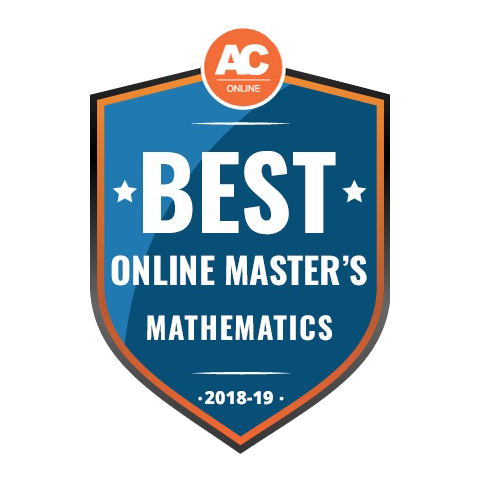
Mathematics
Graduate program.
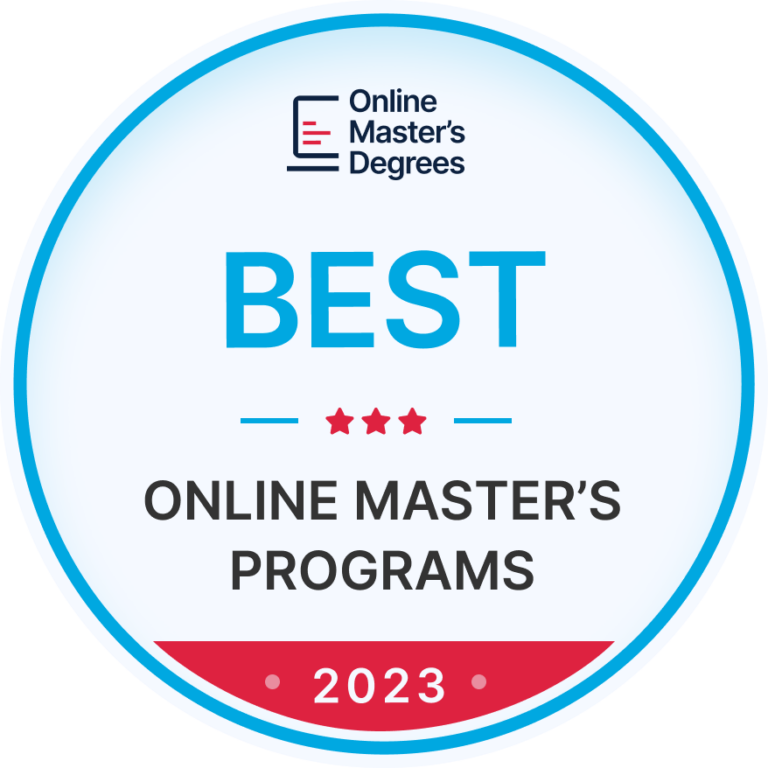
Nicholls State University ranked a top school for online master’s in mathematics for 2023
Nicholls has been ranked as one of the nation’s best colleges for online master’s programs in mathematics. Just six percent of regionally accredited postsecondary institutions earned a ranking position.
Nicholls State University has been recognized as one of the best schools for online learning at the master’s level by OnlineMastersDegrees.org (OMD). Nicholls’s mathematics programs earned top honors for overall quality, affordability and commitment to student success.
See where Nicholls ranked below: Best Online Master’s Degrees in Mathematics – https://www.onlinemastersdegrees.org/best-programs/mathematics/
“This year, we focused on the schools making it easier for students to compete in today’s increasingly difficult job market,” said Kyle Darland, co-founder of OMD. “Each ranked school offers a fully or partially online master’s program in mathematics at a time when earning a master’s has become a minimum barrier to entry for many.”
Darland is referencing a recent survey from CareerBuilder, which found that “thirty-three percent of employers are hiring workers with master’s degrees for positions that had been primarily held by those with four-year degrees.” These employers cited an evolution of the skills needed to perform the jobs as the cause of the shift, and an increase in work quality, productivity and employee retention as the result.
“Providing students with opportunities to get a master’s online is only part of our rankings,” said Darland. “Top-ranked schools also had competitive tuition rates and/or scholarships to help drive costs down. And with grocery, gas and other expenses on everyone’s mind right now, an affordable master’s is key.”
OnlineMastersDegrees.org analyzed more than 7,700 accredited universities by using data pulled from the schools themselves and from the Integrated Postsecondary Education Data System (IPEDS). After the data was compiled, OMD’s data science team then applied a proprietary algorithm to rank all qualifying schools for each of the different master’s degrees specialties. Primary data points include:
- Academic counseling services
- Career placement services
- Student/faculty ratio
- Percent of students receiving school-based aid
- Amount of school-based aid per student
To be eligible for ranking, a university must hold active regional accreditation and have at least one partially online master’s program in the ranking subject. Just 8 percent of U.S. postsecondary institutions earned a ranking position.
About OnlineMastersDegrees.org
OnlineMastersDegrees.org began in 2020 to support online learning at the master’s level. Our user-friendly, research-backed content helps students find scholarships, resources, financial aid, and connect with accredited colleges and universities across the country.
Admission Requirements
In addition to all general requirements for admission to the University and to Graduate Studies, applicants must:
- have a bachelor’s degree (with mathematics training which includes three-dimensional calculus and at least nine additional hours of mathematics at the junior level or above from accredited institutions and approved by the Department); AND
- submit three letters of recommendation; AND
- (i) have a minimum GPA of 2.50 on a 4.00 scale and attain a minimum GRE General Test score of 300; OR (ii) have a minimum GPA of 2.75 on a 4.00 scale; OR (iii) have a minimum GPA of 3.00 on a 4.00 scale on the last 60 hours.
An applicant who has a bachelor’s degree and who has a minimum GPA of 2.50 on a 4.00 scale, and who lacks exactly one of the admission requirements (1), (2), and (3)(i) listed above, may be admitted on conditional status with departmental approval. In the case of item (3)(i), the required GRE score must be received within the first semester of study. In the case of item (1), at most one academic prerequisite should be missing.
Graduate Coursework:
Required Courses (18 hours)
- MATH 509 Logic and Foundations of Mathematics ( cornerstone course normally taken first semester)
- MATH 510 Number-theoretic and Discrete Structures
- MATH 523 Geometric and Algebraic Structures
- MATH 584 Technology and Communication in Mathematics ( capstone course normally taken in final semester)
- MATH 578 Research in Mathematics Education
- MATH 580 Topics in the School Mathematics Curriculum
- MATH 595 Master’s Comprehensive Examination
Elective Courses (15 hours) Elective course work is selected from approved courses in mathematics, education, and/or computer science.
At least nine hours of electives must be mathematics content electives.
- MATH 511 Calculus and Analytic Structures
- MATH 512 Probability and Statistics
- MATH 530 Introduction to Decision Theory
- MATH 540 Applied Matrix Analysis
- MATH 557 Applied Analysis I
- MATH 558 Applied Analysis II
- MATH 570 Mathematical Modeling and Problem Solving
- MATH 573 Topics in the History of Mathematics
- MATH 588 Topics in Mathematics
- MATH 589 Topics in Graduate Mathematics
- MATH 590 Topics in Graduate Mathematics
Computer Science
- CMPS 406* Software Engineering
- CMPS 410* Special Topics
- CMPS 418* Artificial Intelligence and Simulation
Education/Professional Development
- EDFR 503 Philosophy of American Education
- EDFR 513 Independent Study in Education
- EDTL 501 Design and Development of Multimedia Instructional Units
- EDTL 503 Educational Telecommunications, Networks, and the Internet
- EDTL 505 Technology Leadership in Schools
- EDTL 506 Professional Development of K-12 Technology Integration
- EDTL 509 Educational Technology Research, Evaluation, and Assessment
- EDTL 511 Advanced Telecommunications and Distance Learning
- MATH 577 Topics in Mathematics
*Undergraduate courses which may be taken for graduate credit.”
Frequently Asked Questions
*Undergraduate courses which may be taken for graduate credit.
Can I transfer credits from another university?
Answer: A student may transfer from a regionally accredited college or university a maximum of six semester hours of degree program credit, with no grade lower than B, provided that such transfer credit shall be applicable to the degree program. Both resident and extension credits are thus acceptable. Transfer credits are subject to a five-year limitation. The student must formally petition his or her academic dean for acceptance of transfer graduate credit. Final authorization of transferred credit is made by the student’s academic dean. Credit earned at another institution while under academic or non academic suspension will not be accepted by Nicholls for transfer.
Answer: It is expected that all requirements for the Master’s degree (including transfer credits, if any) will be completed within six consecutive years. If requirements for a degree cannot be completed within the normal time period of six years, the student may petition for an extension of time. The petition must explain why the degree cannot be completed within the time schedule for completing the program. Final authorization will be considered only in unusual and justifiable circumstances. A course taken more than six years before completion of degree requirements may be used in a student?s degree program only if revalidated by the professor of record for the course, or one who currently teaches the course. In the event that neither is available, a certifying professor may be designated by the department head for that discipline. Revalidation must be certified in writing after an examination or other work required by the certifying professor. Only courses currently contained in the University Bulletin may be revalidated.
In Education: College instructor Community/Technical college instructor High school teacher Curriculum and Training Consulting
In Business: Analyst Test Development Catalog Prospecting Manager Finance Actuary Consulting
Federal positions: NSA
“The entire program’s structure is particularly well designed, from the curriculum to the nature of the client/students. The courses and requirements are good. The courses take into account the career goals of the students. The rich content of the program will give students the needed skills to teach the intended student body…”
– Report from the Louisiana Board of Regents
Nicholls state university is offering a master’s degree designed for teachers of mathematics taught through distance learning.
This new Master of Science in mathematics is uniquely designed to serve teachers seeking professional development. The program consist of a mathematics/teacher education core consistent with post-secondary mathematics education training. The curriculum will strengthen secondary teachers’ content understanding by enriching their knowledge of logic, mathematics, and technology, as well as curriculum and instruction methods. The majority of the courses are offered online, allowing teachers the convenience of studying at home at their own pace. The structure of this program is unique in the State of Louisiana. The program is titled Master of Science in Community/Technical College Mathematics in order to also attract prospective math instructors for community or technical colleges.
We are excited to offer this unique program to teachers who are interested in obtaining their master’s degree. In addition to being a convenient way of obtaining a degree, this program is the only one in the state which allows teachers to obtain a Master of Science in mathematics while improving their instruction techniques. This program will not only strengthen a teacher’s knowledge of math, but will add successful , modern, teaching techniques to his/her foundation, including successful new methods using technology. The additional knowledge of higher mathematics, along with proven teaching techniques will enhance the teacher’s approach to instruction, as well as create a fresh, new outlook.
The teachers will not be the only ones to benefit from this extraordinary program. The students will also benefit from this new approach. Our students will recognize and appreciate the additional knowledge they will gain, as well as, the change that could take place in the classrooms. These changes include a more creative teaching approach with emphasis on new technology, which is the very thing that today’s students have embraced.
We are looking forward to a brighter future for our math teachers and our future generations of students.

For more information about the Masters of Science in Mathematics program please contact:
Dr. Matthew Gamel Email: [email protected] Phone: 985-448-4382
CONTACT INFORMATION
For more information about the program please contact:.
Dr. Brian Heck, Department Head Email: [email protected] Phone: 985.448.4383

- 1-877-NICHOLLS
- 906 East 1st Street Thibodaux, LA 70301
Quick Links
- Nicholls Email
- Grades First
- Faculty & Staff Directory
Campus Links
- Emergency Preparedness
- IT Help Desk
- Nicholls Police
- Non-Discrimination Policy
- Privacy Notice
- ADA Information
- Diversity & Inclusion
Sign-up for INSIDE NICHOLLS newsletter
Inside Nicholls State University is a weekly email newsletter that is distributed to the campus community communicating Nicholls News and Events.
All content and images ©2024 Nicholls State University
Member of the University of Louisiana System
Privacy overview.
- Areas of Study
- Courses and Curriculum
- Open Courses
- Register for a Program
- Certificate Program
- Associate in Actuarial Science
- Associate in Addiction Counseling
- Associate in Agriculture Food And Resources
- Associate in Animal Science
- Associate in Anti Terrorism Security
- Associate in Behavior Analysis In Special Education
- Associate in Bioethics
- Associate in Biosystems
- Associate in Blockchain Technology & Digital Currency
- Associate in Business Communication
- Associate in Business Management
- Associate in Chemistry
- Associate in Climatology
- Associate in Cloud Computing
- Associate in Computer Engineering
- Associate in Computer Programming
- Associate in Computer Science
- Associate in Criminal Justice
- Associate in Culinary Arts
- Associate in Cultural Theological Communication
- Associate in Cybersecurity And Hacking
- Associate in Data Communication And Networking
- Associate in Database Administrator
- Associate in Early Childhood Education
- Associate in Ecotechnology
- Associate in Ecotourism
- Associate in Education
- Associate in Educational Technology
- Associate in Electric Vehicle Engineering
- Associate in Electrochemical Engineering
- Associate in Electronic Engineering
- Associate in English Literature
- Associate in Environmental Science
- Associate in eVTOL Engineering
- Associate in Fashion Design
- Associate in Fine Arts
- Associate in Foreign Trade
- Associate in Genetic Engineering
- Associate in Geography
- Associate in Geology
- Associate in Geophysical Sciences
- Associate in Graphic Design
- Associate in Health Sciences
- Associate in History
- Associate in Human Resources
- Associate in Integrated Water Management
- Associate in International Finance
- Associate in International Marketing
- Associate in Islamic Studies
- Associate in Kinesiology And Physiotherapy
- Associate in Library technology
- Associate in Linguistics
- Associate in Management
- Associate in Management Information Systems
- Associate in Maritime Management
- Associate in Metallurgy
- Associate in Micro and Multimode Grid Design
- Associate in Modern Power and Energy Systems
- Associate in Multimedia Design and Digital Art
- Associate in Nutrition
- Associate in Oil Gas And Energy Engineering
- Associate in Operations Management
- Associate in Optoelectronic Systems
- Associate in Organizational Development
- Associate in Organizational Diversity
- Associate in Pedagogical Training For Professionals
- Associate in Physical Culture And Sports
- Associate in Physics
- Associate in Public Health
- Associate in Quantum Computing Technology
- Associate in Radio And Television Production
- Associate in Scenography
- Associate in Social Media Marketing
- Associate in Sociology
- Associate in Sports Marketing
- Associate in Sports Psychology
- Associate in Sustainable Design and Construction
- Associate in Sustainable Materials Science
- Associate in Sustainable Natural Resources Management
- Associate in Sustainable Tourism
- Associate in Synthetic Biology
- Associate in Virtual Archival Science
- Associate of Adult Education
- Associate of Advertising
- Associate of Agriculture
- Associate of American History
- Associate of Biology
- Associate of Chemical Engineering
- Associate of Civil Engineering
- Associate of Communications
- Associate of Construction Management
- Associate of Economics
- Associate of Educational Administration
- Associate of Electrical Engineering
- Associate of Finance
- Associate of Healthcare Administration
- Associate of Human Resources Management
- Associate of Humanities
- Associate of Hydrology
- Associate of Industrial Engineering
- Associate of Information Systems
- Associate of Information Technology
- Associate of Interior Design
- Associate of International Relations
- Associate of Journalism
- Associate of Legal Studies
- Associate of Logistics
- Associate of Marketing
- Associate of Mass Media and Communication
- Associate of Mathematics
- Associate of Mechanical Engineering
- Associate of Mining Engineering
- Associate of Music
- Associate of Nutrition Science
- Associate of Philosophy
- Associate of Physical Education
- Associate of Political Science
- Associate of Project Management
- Associate of Psychology
- Associate of Renewable Energy
- Associate of Software Engineering
- Associate of Sport Science
- Associate of Statistics
- Associate of Strategic Management
- Associate of Technical Writing
- Associate of Telecommunications
- Associate of Theater
- Associate of Theology
- Associate of Tourism Planning and Development
- Associate of Travel and Tourism
- Associate of Unmanned Areal Systems Engineering
- Associates in Artificial Intelligence
- Associates in Engineering Systems
- Associates in Physical Anthropology
- Associates in Social Sciences
- Associates in Sociocultural Anthropology
- Associates in Systems Engineering
- Associates of Accounting
- Associates of Anthropology
- Associates of Archeology
- Associates of Architecture
- Associates of Art History
- Associates of Banking and Finance
- Associates of Business Administration
- Associates of Public Administration
- Associates of Science
- Associates of Urban Planning
- Associates of Visual and Performing Arts
- Micro and Multimode Grid Design
- Bachelor in Data Communication and Networking
- Bachelor in Actuarial Science
- Bachelor in Addiction Counseling
- Bachelor in Agriculture, Food and Resources
- Bachelor in Animal Science
- Bachelor in Anti Terrorism Security
- Bachelor in Artificial Intelligence
- Bachelor in Arts in Cultural Theological Communication
- Bachelor in Autonomous Vehicle Technology
- Bachelor in Bachelor of Bioethics (BA)
- Bachelor in Behavior Analysis in Special Education
- Bachelor in Bibliotechnology
- Bachelor in Biosystems
- Bachelor in Blockchain Technology & Digital Currency
- Bachelor in Business Communication
- Bachelor in Business Management
- Bachelor in Chemistry
- Bachelor in Cloud Computing
- Bachelor in Computer Science
- Bachelor in Criminal Justice
- Bachelor in Culinary Arts
- Bachelor in Cybersecurity and Hacking
- Bachelor in Database Administrator (BS)
- Bachelor in Ecotechnology
- Bachelor in Ecotourism
- Bachelor in Education (B.Ed, BS)
- Bachelor in Educational Technology
- Bachelor in Electric Vehicle Engineering
- Bachelor in Electrochemical Engineering
- Bachelor in English Literature
- Bachelor in eVTOL Engineering
- Bachelor in Fashion Design (BA)
- Bachelor in Fine Arts
- Bachelor in Foreign Trade
- Bachelor in Genetic Engineering
- Bachelor in Geology
- Bachelor in Geophysical Sciences
- Bachelor in Graphic Design
- Bachelor in Health Sciences
- Bachelor in Integrated Water Management
- Bachelor in International Finance
- Bachelor in International Marketing
- Bachelor in Islamic Studies
- Bachelor in Kinesiology and Physiotherapy
- Bachelor in Linguistics
- Bachelor in Management
- Bachelor in Metallurgy
- Bachelor in Micro and Multimode Grid Design
- Bachelor in Modern Power and Energy Systems
- Bachelor in Multimedia Design and Digital Art
- Bachelor in Nutrigenetics
- Bachelor in Operations Management (BA)
- Bachelor in Optoelectronic Systems
- Bachelor in Organizational Development
- Bachelor in Organizational Diversity
- Bachelor in Physical Anthropology
- Bachelor in Physical Culture And Sports
- Bachelor in Public Relations
- Bachelor in Quantum Computing Technology
- Bachelor in Radio And Television Production
- Bachelor in Scenography
- Bachelor in Social Media Marketing
- Bachelor in Social Sciences
- Bachelor in Sociocultural Anthropology
- Bachelor in Sport Management
- Bachelor in Sports Marketing
- Bachelor in Sports Psychology
- Bachelor in Sustainable Design and Construction
- Bachelor in Sustainable Materials Science
- Bachelor in Sustainable Natural Resources Management
- Bachelor in Sustainable Tourism
- Bachelor in Synthetic Biology
- Bachelor in Virtual Archival Science
- Bachelor of Adult Education
- Bachelor of Advertising
- Bachelor of Animation
- Bachelor of Art History
- Bachelor of Biohacking and Nutrigenomics
- Bachelor of Educational Administration
- Bachelor of Healthcare Administration
- Bachelor of Human Resources Management
- Bachelor of Humanities
- Bachelor of Hydrology
- Bachelor of Information Technology
- Bachelor of Mass Media and Communication
- Bachelor of Philosophy
- Bachelor of Physical Education
- Bachelor of Project Management
- Bachelor of Public Administration
- Bachelor of Software Engineering
- Bachelor of Sport Science
- Bachelor of Sports Science
- Bachelor of Statistics
- Bachelor of Strategic Management
- Bachelor of Technical Writing
- Bachelor of Theater
- Bachelor of Theology
- Bachelor of Tourism Planning and Development
- Bachelor of Travel and Tourism
- Bachelor of Unmanned Areal Systems Engineering
- Bachelor of Urban Planning
- Bachelor of Visual and Performing Arts
- Bachelor of Web Design
- Bachelors in Energy Storage and Battery Technology
- Bachelors in Accounting
- Bachelors in Accounting & Finance
- Bachelors in Agronomy Engineering
- Bachelors in Anthropology
- Bachelors in Architecture
- Bachelors in Automotive Engineering
- Bachelors in Banking and Finance
- Bachelors in Biology
- Bachelors in Business Administration
- Bachelors in Chemical Engineering
- Bachelors in Civil Engineering
- Bachelors in Communications
- Bachelors in Computer Engineering
- Bachelors in Criminal Justice
- Bachelors in Early Childhood Education
- Bachelors in Economics
- Bachelors in Electrical Engineering
- Bachelors in Electromechanical Engineering
- Bachelors in Electronic Engineering
- Bachelors in Engineering
- Bachelors in Environmental Science
- Bachelors in Finance
- Bachelors in Finance and Banking
- Bachelors in Health Sciences
- Bachelors in History
- Bachelors in Hospitality Management
- Bachelors in Human Resources
- Bachelors in Industrial Engineering
- Bachelors in Information Systems
- Bachelors in Interior Design
- Bachelors in International Business
- Bachelors in International Relations
- Bachelors in Journalism
- Bachelors in Legal Studies
- Bachelors in Logistics
- Bachelors in Marketing
- Bachelors in Mathematics
- Bachelors in Mechanical Engineering
- Bachelors in Mining Engineering
- Bachelors in Music
- Bachelors in Nutrition
- Bachelors in Oil Gas and Energy Engineering
- Bachelors in Pedagogy
- Bachelors in Physics
- Bachelors in Political Science
- Bachelors in Psychology
- Bachelors in Public Health
- Bachelors in Public Security
- Bachelors in Renewable Energy
- Bachelors in Sociology
- Bachelors in Systems Engineering
- Bachelors in Telecommunications
- Bachelors in Zoology
- DBA – Doctor of Business Administration
- Doctor | in Actuarial Science
- Doctor | in Agriculture Food And Resources
- Doctor | in Animal Science
- Doctor | in Biosystems
- Doctor | in Cultural Theological Communication
- Doctor | in Cybersecurity And Hacking
- Doctor | in Early Childhood Education
- Doctor | in Ecotechnology
- Doctor | In Ecotourism
- Doctor | In Educational Technology
- Doctor | In Electronic Engineering
- Doctor | In Foreign Trade
- Doctor | of Biology (PhD)
- Doctor in Addiction Counseling
- Doctor in Behavior Analysis In Special Education
- Doctor in Bibliotechnology
- Doctor in Business Management
- Doctor in Data Communication And Networking
- Doctor of Adult Education
- Doctor of Agriculture
- Doctor of American History
- Doctor of Animation
- Doctor of Anthropology
- Doctor of Archaeology
- Doctor of Architecture (Ph.D.)
- Doctor of Art History
- Doctor of Artificial Intelligence
- Doctor of Autonomous Vehicle Technology
- Doctor of Biohacking and Nutrigenomics
- Doctor of Business Management (DBM)
- Doctor of Civil Engineering (D.Sc)
- Doctor of Cloud Computing
- Doctor of Economics (PhD)
- Doctor of Educational Administration (PhD)
- Doctor of Electric Vehicle Engineering
- Doctor of Electrical Engineering (D.Sc, PhD)
- Doctor of Electrochemical Engineering
- Doctor of Engineering Systems (D.Sc)
- Doctor of eVTOL Engineering
- Doctor of Finance (PhD)
- Doctor of Humanities
- Doctor of Hydrology
- Doctor of Industrial Engineering (D.Sc)
- Doctor of International Relations (D.Sc)
- Doctor of Legal Studies (PhD)
- Doctor of Logistics
- Doctor of Mass Media and Communication
- Doctor of Mechanical Engineering (D.Sc)
- Doctor of Micro and Multimode Grid Design
- Doctor of Mining Engineering
- Doctor of Music
- Doctor of Nutrition Science
- Doctor of Optoelectronic Systems
- Doctor of Project Management (PhD)
- Doctor of Public Administration
- Doctor of Public Health (PhD, D.Sc)
- Doctor of Quantum Computing
- Doctor of Renewable Energy
- Doctor of Sociology (PhD, D.Sc)
- Doctor of Software Engineering
- Doctor of Sport Management
- Doctor of Sport Science
- Doctor of Statistics
- Doctor of Technical Writing
- Doctor of Telecommunications (D.Sc)
- Doctor of Theater
- Doctor of Tourism Planning and Development
- Doctor of Travel and Tourism
- Doctor of Unmanned Aerial Systems Engineering
- Doctor of Visual and Performing Arts
- Doctor of Web Design
- Doctoral Degree Programs
- Doctoral in International Finance
- Doctorate in Accounting
- Doctorate in Actuarial Science
- Doctorate in Adult Counseling
- Doctorate in Advertising
- Doctorate in Agriculture Food And Resources
- Doctorate in Animal Science
- Doctorate in Anti Terrorism Security
- Doctorate in Behavior Analysis In Special Education
- Doctorate in Bibliotechnology
- Doctorate in Bioethics
- Doctorate in Biosystems
- Doctorate in Business Administration (DBA, PhD)
- Doctorate in Business Communication
- Doctorate in Business Management
- Doctorate in Chemical Engineering (D.Sc)
- Doctorate in Chemistry
- Doctorate in Clinical Nutrition
- Doctorate in Communication Online (D.Sc)
- Doctorate in Computer Engineering
- Doctorate in Computer Science
- Doctorate in Conflict Resolution & Peace Building
- Doctorate in Criminal Justice
- Doctorate in Culinary Arts
- Doctorate in Cultural Theological Communication
- Doctorate in Cyber Security & Hacking
- Doctorate in Data Communication And Networking
- Doctorate in Digital Marketing
- Doctorate in Early Childhood Education
- Doctorate in Ecotechnology
- Doctorate in Ecotourism
- Doctorate in Education
- Doctorate in Educational Technology
- Doctorate in Electronic Engineering
- Doctorate in Environmental Science
- Doctorate in Fashion Design
- Doctorate in Fine Arts
- Doctorate in Foreign Trade
- Doctorate in Genetic Engineering
- Doctorate in Geophysical Sciences
- Doctorate in Global Health
- Doctorate in Health Sciences
- Doctorate in Healthcare Administration Programs (PhD)
- Doctorate in Hospital Administration
- Doctorate in Human Resource Management (PhD)
- Doctorate in Human Resources
- Doctorate in Information Systems (D.Sc)
- Doctorate in Information Technology (D.Sc)
- Doctorate in Integrated Water Management
- Doctorate in Interior Design (PhD)
- Doctorate in International Marketing
- Doctorate in International Relations
- Doctorate in Islamic Studies
- Doctorate in Journalism (PhD)
- Doctorate in Kinesiology & Physiotherapy
- Doctorate in Linguistics
- Doctorate in Management
- Doctorate in Maritime Management
- Doctorate in Marketing (PhD)
- Doctorate in Mathematics
- Doctorate in Metallurgy
- Doctorate in Modern Power and Energy Systems
- Doctorate in Multimedia Design and Digital Art
- Doctorate in Oil Gas And Energy Engineering
- Doctorate in Organizational Development
- Doctorate in Organizational Diversity
- Doctorate in Pedagogical Training For Professionals
- Doctorate in Physical Anthropology
- Doctorate in Physical Culture And Sports
- Doctorate in Physical Education (D.Sc)
- Doctorate in Political Science
- Doctorate in Psychology (PhD, DPsy)
- Doctorate in Radio And Television Production
- Doctorate in Scenography
- Doctorate in Security Management
- Doctorate in Social Media Marketing
- Doctorate in Sociocultural Anthropology
- Doctorate in Sports Management
- Doctorate in Sports Marketing
- Doctorate in Sports Psychology
- Doctorate in Strategic Leadership
- Doctorate in Strategic Management
- Doctorate in Sustainable Design and Construction
- Doctorate in Sustainable Materials Science
- Doctorate in Sustainable Natural Resources Management
- Doctorate in Sustainable Tourism
- Doctorate in Synthetic Biology
- Doctorate in Virtual Archival Science
- Doctorate of Theology
- DS – Doctorate in Science
- Online Doctorate in Health Administration
- Online Doctorate in Hospitality
- Online Doctorate in Philosophy
- Postdoctoral in Bioethics
- School of Social and Human Studies
- Master in Actuarial Science
- Master in Addiction Counseling
- Master in Agriculture Food And Resources
- Master in Animal Science
- Master in Anti Terrorism Security
- Master in Autonomous Vehicle Technology
- Master in Behavior Analysis In Special Education
- Master in Bibliotechnology
- Master in Bioethics
- Master in Biosystems
- Master in Blockchain Technology and Digital Currency
- Master in Business Communication
- Master in Chemistry
- Master in Climatology
- Master in Cloud Computing
- Master in Computer Programming
- Master in Criminal Justice
- Master in Culinary Arts
- Master in Cultural Theological Communication
- Master in Cybersecurity And Hacking
- Master in Data Communication And Networking
- Master in Database Administrator
- Master in Early Childhood Education
- Master in Ecotechnology
- Master in Ecotourism
- Master in Educational Technology
- Master in Electric Vehicle Engineering
- Master in Electronic Engineering
- Master in Energy Storage and Battery Technology
- Master in Engineering Systems (MS)
- Master in Environmental Science
- Master in eVTOL Engineering
- Master in Fashion Design
- Master in Fine Arts
- Master in Foreign Trade
- Master in Geography
- Master in Geophysical Sciences
- Master in Graphic Design
- Master in Health Sciences
- Master in History
- Master in Industrial Engineering
- Master in Integrated Water Management
- Master in International Finance
- Master in Islamic Studies
- Master in Kinesiology And Physiotherapy
- Master in Linguistics
- Master in Management
- Master in Management Information Systems
- Master in Mass Media and Communication
- Master in Metallurgy
- Master in Micro and Multimode Grid Design
- Master in Microbiology
- Master in Modern Power and Energy Systems
- Master in Multimedia Design and Digital Art
- Master in Nutritional Science
- Master in Oil Gas And Energy Engineering
- Master in Organizational Development
- Master in Organizational Diversity
- Master in Pedagogical Training For Professionals
- Master in Philosophy
- Master in Physical Anthropology
- Master in Physical Culture And Sports
- Master in Public Administration (MA)
- Master in Quantum Computing
- Master in Radio And Television Production
- Master in Scenography
- Master in Social Media Marketing
- Master in Social Sciences
- Master in Sociocultural Anthropology
- Master in Sociology (MA, MS)
- Master in Software Engineering
- Master in Sport Management
- Master in Sport Science
- Master in Sports Marketing
- Master in Sports Psychology
- Master in Statistics
- Master in Strategic Management
- Master in Sustainable Design and Construction
- Master in Sustainable Materials Science
- Master in Sustainable Natural Resources Management
- Master in Sustainable Tourism
- Master in Synthetic Biology
- Master in Technical Writing
- Master in Theater
- Master in Theology
- Master in Unmanned Aerial Systems Engineering (UAV and Drone Technology)
- Master in Virtual Archival Science
- Master of Adult Education
- Master of Advertising (MS, MBA)
- Master of Agriculture (MS)
- Master of American History
- Master of Animation
- Master of Anthropology (MA)
- Master of Archeology (MA)
- Master of Art History (MA)
- Master of Artificial Intelligence
- Master of Banking and Finance (MA)
- Master of Biohacking and Nutrigenomics
- Master of Biology (MS)
- Master of Business Management (MS, MBM)
- Master of Chemical Engineering (MS)
- Master of Computer Engineering
- Master of Construction Management
- Master of Human Resources Management (MHRM)
- Master of Humanities (MA)
- Master of Hydrology (MS)
- Master of Interior Design (MA)
- Master of International Relations (MS)
- Master of Journalism (MA, MJ)
- Master of Logistics (MA)
- Master of Marketing (MS, MBA, MPA)
- Master of Mathematics (MS)
- Master of Mechanical Engineering (MS)
- Master of Mining Engineering (MS)
- Master of Music (MA)
- Master of Nutrition Science
- Master of Physical Education (MS)
- Master of Renewable Energy (MS)
- Master of Science in Educational Administration (MS)
- Master of Science in Healthcare Administration (MS)
- Master of Tourism Planning and Development
- Master of Travel and Tourism
- Master of Urban Planning
- Master of Visual and Performing Arts
- Master of Web Design
- Masters in Accounting
- Masters in Architecture
- Masters in Business Administration
- Masters in Business Management
- Masters in Civil Engineering
- Masters in Communication
- Masters in Computer Science
- Masters in Economics
- Masters in Education
- Masters in Electrical Engineering
- Masters in Finance
- Masters in Human Resources
- Masters in Information Systems
- Masters in Information Technology
- Masters in International Business
- Masters in International Marketing
- Masters in International Relations
- Masters in Legal Studies
- Masters in Political Science
- Masters in Project Management
- Masters in Psychology
- Masters in Public Health
- Masters in Telecommunications
- Postdoctoral in Actuarial Science
- Postdoctoral in Addiction Counseling
- Postdoctoral in Animal Science
- Postdoctoral in Anti Terrorism Security
- Postdoctoral in Autonomous Vehicle Technology
- Postdoctoral in Behavior Analysis In Special Education
- Postdoctoral in Bibliotechnology
- Postdoctoral in Biohacking and Nutrigenomics
- Postdoctoral in Biosystems
- Postdoctoral in Blockchain Technology and Digital Currency
- Postdoctoral in Business Communication
- Postdoctoral in Business Management
- Postdoctoral in Chemistry
- Postdoctoral in Cloud Computing
- Postdoctoral in Computer Engineering
- Postdoctoral in Computer Science
- Postdoctoral in Criminal Justice
- Postdoctoral in Culinary Arts
- Postdoctoral in Cultural Theological Communication
- Postdoctoral in Cybersecurity And Hacking
- Postdoctoral in Data Communication And Networking
- Postdoctoral in Early Childhood Education
- Postdoctoral in Ecotechnology
- Postdoctoral in Ecotourism
- Postdoctoral in Education
- Postdoctoral in Educational Technology
- Postdoctoral in Electrical Vehicle Engineering
- Postdoctoral in Electrochemical Engineering
- Postdoctoral in Electronic Engineering
- Postdoctoral in Energy Storage and Battery Technology
- Postdoctoral in Engineering Systems
- Postdoctoral in English Literature
- Postdoctoral in Environmental Science
- Postdoctoral in eVTOL Engineering
- Postdoctoral in Fashion Design
- Postdoctoral in Fine Arts
- Postdoctoral in Foreign Trade
- Postdoctoral in Genetic Engineering
- Postdoctoral in Geophysical Sciences
- Postdoctoral in Graphic Design
- Postdoctoral in Health Sciences
- Postdoctoral in Human Resources
- Postdoctoral in Humanities
- Postdoctoral in Integrated Water Management
- Postdoctoral in International Finance
- Postdoctoral in International Marketing
- Postdoctoral in International Relations
- Postdoctoral in Islamic Studies
- Postdoctoral in Journalism
- Postdoctoral in Kinesiology And Physiotherapy
- Postdoctoral in Linguistics
- Postdoctoral in Logistics
- Postdoctoral in Management
- Postdoctoral in Marketing
- Postdoctoral in Mass Communication
- Postdoctoral in Mathematics
- Postdoctoral in Metallurgy
- Postdoctoral in Micro and Multimode Grid Design
- Postdoctoral in Mining Engineering
- Postdoctoral in Modern Power and Energy Systems
- Postdoctoral in Multimedia Design and Digital Art
- Postdoctoral in Music
- Postdoctoral in Nutrigenetics
- Postdoctoral in Nutrition
- Postdoctoral in Oil, Gas and Energy Engineering
- Postdoctoral in Organizational Development
- Postdoctoral in Organizational Diversity
- Postdoctoral in Pedagogical Training For Professionals
- Postdoctoral in Philosophy
- Postdoctoral in Physical Anthropology
- Postdoctoral in Physical Culture And Sports
- Postdoctoral in Political Science
- Postdoctoral in Public Administration
- Postdoctoral in Public Health
- Postdoctoral in Quantum Computing
- Postdoctoral in Radio And Television Production
- Postdoctoral in Social Media Marketing
- Postdoctoral in Social Sciences
- Postdoctoral in Sociocultural Anthropology
- Postdoctoral in Sociology
- Postdoctoral in Software Engineering
- Postdoctoral in Sport Management
- Postdoctoral in Sport Science
- Postdoctoral in Sports Marketing
- Postdoctoral in Sports Psychology
- Postdoctoral in Statistics
- Postdoctoral in Strategic Management
- Postdoctoral in Sustainable Design and Construction
- Postdoctoral in Sustainable Materials Science
- Postdoctoral in Sustainable Natural Resources Management
- Postdoctoral in Sustainable Tourism
- Postdoctoral in Synthetic Biology
- Postdoctoral in Technical Writing
- Postdoctoral in Theater
- Postdoctoral in Theology
- Postdoctoral in Virtual Archival Science
- Postdoctoral of Biology
- Postdoctoral of Industrial Engineering
- Postdoctoral of Information Systems
- Postdoctoral of Legal Studies
- Postdoctoral Research in Accounting
- Postdoctoral Research in Adult Education
- Postdoctoral Research in Advertising
- Postdoctoral Research in Agriculture
- Postdoctoral Research in American History
- Postdoctoral Research in Animation
- Postdoctoral Research in Anthropology
- Postdoctoral Research in Archeology
- Postdoctoral Research in Architecture
- Postdoctoral Research in Art History
- Postdoctoral Research in Artificial Intelligence
- Postdoctoral Research in Banking and Finance
- Postdoctoral Research in Business Administration
- Postdoctoral Research in Business Management
- Postdoctoral Research in Chemical Engineering
- Postdoctoral Research in Civil Engineering
- Postdoctoral Research in Communications
- Postdoctoral Research in Economics
- Postdoctoral Research in Educational Administration
- Postdoctoral Research in Electrical Engineering
- Postdoctoral Research in Finance
- Postdoctoral Research in Healthcare Administration
- Postdoctoral Research in Human Resources Management
- Postdoctoral Research in Information Technology
- Postdoctoral Research in Interior Design
- Postdoctoral Research in International Relations
- Postdoctoral Research in Mechanical Engineering
- Postdoctoral Research in Physical Education
- Postdoctoral Research in Project Management
- Postdoctoral Research in Psychology
- Postdoctoral Research in Renewable Energy
- Postdoctoral Research in Scenography
- Postdoctoral Research in Telecommunications
- Postdoctoral Research in Tourism Planning and Development
- Postdoctoral Research in Travel and Tourism
- Postdoctoral Research in Unmanned Aerial Systems Engineering (UAV and drone technology)
- Postdoctoral Research in Urban Planning
- Postdoctoral Research in Visual and Performing Arts
- Postdoctoral Research in Web Design
- Postdoctoral Research Program
Distance Learning at AIU is enhanced by vast academic resources and innovative technologies build into the Virtual Campus: Hundreds of self-paced courses with video lectures and step by step lessons, thousands of optional assignments, 140,000 e-books, the Social Media & Networking platform allowing collaboration/chat/communications between students, and MYAIU develop students holistically in 11 areas beyond just academics.
The world is YOUR campus!”, that is the message of AIU’s month magazine Campus Mundi. Hear the voices and see the faces that make up AIU. Campus Mundi brings the world of AIU to you every months with inspirational stories, news and achievements by AIU members from around the world (students and staff are located in over 200 countries).

Please enter your credentials
Student Advisor Administrator Admissions Quiz Editor Link Exchange
keep me logged-in
The Complete Guide To Distance Learning Program: What It Is, And How To Get Started

In recent years, distance learning has emerged as a powerful educational tool, offering flexibility and accessibility to learners worldwide. According to the National Center for Education Statistics (NCES), around 7.5 million U.S. students depend upon online classes for higher education. In fact, the Covid-19 pandemic has played a big role in accelerating the popularity of remote learning from 2020. It has reshaped the modern learning system especially in higher education offering students flexibility in learning. It is quite an evolution to step out of a traditional classroom setting and enter the digital world of learning where nothing can stop a curious mind from gaining knowledge.
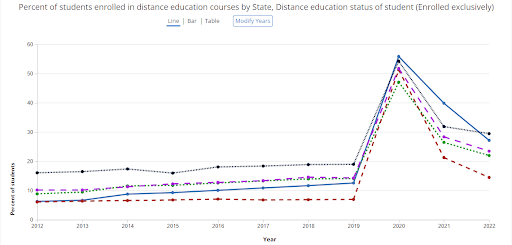
Source: U.S. Department of Education, National Center for Education Statistics
Definition and Significance of Distance Learning
What is distance learning program.
Distance learning, also known as online learning or e-learning, encompasses various educational formats that allow students to learn remotely, often utilizing digital technologies and the same internet connection. This mode of education transcends geographical boundaries, enabling individuals to access quality education regardless of location or time constraints.
The significance of distance learning lies in its ability to democratize education, making it accessible to a diverse range of learners, including working professionals, individuals with disabilities, and those residing in remote areas with limited access to traditional educational institutions. Moreover, distance learning offers flexibility, allowing students to balance their studies with other commitments, such as work or family responsibilities. For Atlantic international University our model of Academic Freedom and self determination where the student is empowered to chart his/her own unique path have led to a customized Learning Management System (LMS) and Virtual Campus. At the core of it is freedom of choice bringing together daily live classes, weekly optional assignments, AI assisted course creation, Mini-Courses to facilitate microlearning, Symposiums and Webinars for students and staff to exchange ideas and robust library resources such as 260,000 books accessible online. As a community component Gamification of the learning process such as earning badges, unlocking gifts and AIULink which is AIU’s social media platform/networking via AIULink create the opportunity for online students to join together and collaborate.
Overview of the Article’s Focus
This article provides a comprehensive guide to everything educators and learners need to know for successful distance learning programs. We will explore critical components that contribute to the effectiveness of distance learning, including:
- Technological Infrastructure: This section provides an overview of the essential technological tools and platforms required for seamless online learning experiences, such as learning management systems (LMS), video conferencing software, and collaboration tools.
- Pedagogical Strategies: Insights into effective teaching methodologies tailored for distance learning environments, including asynchronous and synchronous learning approaches, interactive multimedia content, and assessment strategies that promote engagement and learning outcomes.
- Student Support Services: This section discusses the importance of robust student support services in distance learning programs , including online tutoring, academic advising, and technical assistance, to enhance student success and retention rates.
- Accessibility and Inclusivity: Consider accessibility standards and practices to ensure that distance learning programs accommodate diverse learners, including those with disabilities, linguistic differences, or varying learning preferences.
- Best Practices for Engagement and Motivation: Strategies for fostering active participation, collaboration, and intrinsic motivation among distance learners, such as gamification, peer interaction, and personalized learning experiences.
- Evaluation and Continuous Improvement: Guidance on monitoring and evaluating the effectiveness of distance learning programs through feedback mechanisms, data analytics, and iterative improvements to enhance overall quality and learner satisfaction.
What Are the Infrastructure Requirements for Successful Distance Learning Programs?
Access to reliable internet connectivity.
- Reliable internet connectivity is paramount for seamless participation in online education, remote learning classes online, and virtual classrooms.
- Internet access enables students to engage in e-learning initiatives, access Internet-based education resources, take online classes and receive remote instruction.
- It facilitates web-based distance learning courses, through digital education platforms, ensuring uninterrupted access to distance education courses and online learning opportunities.
Availability of Suitable Devices (Computers, Tablets, etc.)
- Access to suitable devices such as computers, tablets, or smartphones is essential for accessing online education resources and participating in remote learning activities.
- These devices allow students to connect to their virtual classroom, engage in e-learning initiatives, and access digital education platforms.
- Ensuring the availability of devices enables students to fully leverage distance education courses and take advantage of online learning opportunities from anywhere.
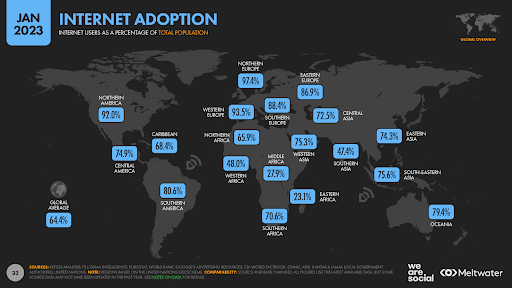
Necessary Software and Applications for Online Learning
- The availability of necessary software and applications is crucial for facilitating compelling online learning experiences.
- These software tools enable students to interact with online courses and materials, participate in virtual classrooms, and engage in collaborative activities.
- Essential software and applications may include learning management systems (LMS), video conferencing tools, interactive multimedia resources, and productivity suites tailored for digital education platforms. Some examples are: Moodle, Blackboard, AtNova or self-development such as .NET used by AIU.
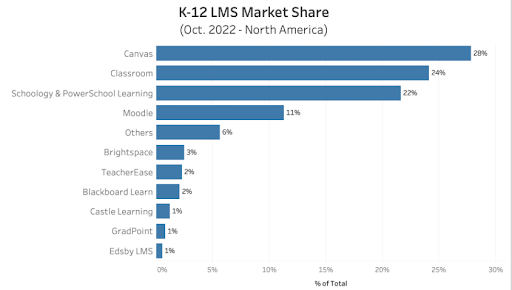
By addressing these infrastructure requirements, educational institutions can create an online environment more conducive to successful distance learning programs, ensuring students can access the tools and resources necessary for engaging and impactful online education experiences.
Academic Preparedness for Successful Distance Learning Programs
- Understanding the Expectations of Distance Learning Courses:
In transitioning to online education, whether through remote learning, virtual classrooms , or e-learning initiatives, students must grasp the unique expectations of distance learning courses. Unlike traditional classroom settings, where face-to-face interactions may dominate, online education relies heavily on web-based and digital learning platforms.
Students must familiarize themselves with the structure of these online courses, including assignment deadlines, communication protocols, and participation expectations. Understanding these expectations is crucial for navigating distance education courses effectively and maximizing online learning opportunities.
- Importance of Self-Discipline and Motivation:
One of the cornerstones of academic preparedness in online education is the cultivation of self-discipline and motivation. Without the physical presence of instructors or classmates to provide immediate accountability, students in online program must take proactive measures to stay engaged and on track.
Remote instruction requires high self-motivation to overcome potential distractions and maintain consistent study habits. Developing time management skills, setting realistic goals, and staying organized are essential for sustaining academic progress in web-based learning environments. Self-discipline and motivation play pivotal roles in ensuring success in distance education courses.
- Assessing One’s Readiness for Online Education:
Before embarking on distance education courses, students must assess their readiness for online learning. This involves candidly evaluating one’s learning style, technological proficiency, and personal circumstances. While online learning offers flexibility and convenience, it also requires a degree of independence and adaptability.
Students should reflect on their ability to thrive in remote online learning platforms and environments, considering their comfort with digital tools, availability of reliable internet connectivity, and capacity to manage competing priorities. Assessing readiness for online education enables individuals to make informed decisions about pursuing distance learning programs. It ensures they are adequately prepared to meet the challenges and opportunities presented by web-based learning platforms.
How Does Time Management and Organization Work in Online Education?
Time management and organization are paramount in navigating the complexities of online education and remote learning. With virtual classrooms open schedule online courses and e-learning initiatives, students must proactively create a study schedule and adhere to it diligently. Prioritizing tasks and assignments ensure that essential deadlines are met in distance education courses.
Leveraging digital education platforms and web-based learning tools facilitates efficient time management, allowing students to streamline their workflow and optimize productivity. Techniques such as breaking tasks into manageable chunks and utilizing time-blocking strategies can further enhance organization and focus. By embracing these practices, online learners can effectively balance their academic responsibilities with other commitments, maximizing online learning opportunities and achieving success in remote instruction.
- Communication and Interaction in Online Education
Communication and interaction play vital roles in online education, facilitating engagement and collaboration among students and instructors. Through digital education platforms and web-based learning environments, participants can leverage various tools and channels to connect with peers and instructors. Utilizing online platforms for communication enables students to engage in remote instruction, participate actively in virtual classrooms, and contribute to discussion forums within distance education courses.
Actively seeking clarification and feedback when needed fosters a supportive online learning environment and community where questions are addressed and ideas are exchanged. By embracing these communication channels, students can enhance their understanding of course material, develop critical thinking skills, and build meaningful connections with peers and instructors, ultimately enriching the online learning experience and maximizing online learning opportunities.
- Access to Support Services
Access to Support Services is integral for success in online education. Firstly, for traditional classroom courses, the availability of academic advising and tutoring services ensures students receive guidance and assistance in their educational journey, enhancing their understanding and performance. Secondly, accessibility to technical support for troubleshooting issues with digital platforms or devices enables smooth navigation of online learning environments, reducing potential barriers to learning.
Lastly, utilizing online libraries and resources for research and study materials expands students’ access to information, facilitating comprehensive learning experiences. These support services collectively create a conducive and supportive environment for students pursuing distance education courses and online programs, empowering them to achieve their educational goals effectively.
- Strategies for Success
Success in online education requires proactive engagement and collaboration within virtual classrooms and digital education platforms. Actively participating in course materials online class, fosters more profound understanding and retention, enhancing learning outcomes in remote instruction. Collaborating with classmates on group projects and assignments promotes teamwork and shared knowledge, enriching the online learning experience.
Additionally, seeking opportunities for networking and professional development within internet-based higher education and communities broadens horizons and cultivates valuable connections. By embracing these strategies, students can navigate distance education courses effectively, leveraging online learning opportunities to their fullest potential. Through active engagement, collaboration, and networking, learners can thrive in the dynamic landscape of remote learning, achieving academic excellence and personal growth in online education.
At AIU we Pledge for a better world
>> How long does it take to complete a bachelor’s program? Click Here
Conclusion- Elevate your online education offerings
Throughout this guide, Distance learning has emerged as a transformative force in education, providing unprecedented flexibility and accessibility to learners worldwide. As defined, distance learning transcends geographical boundaries, empowering individuals to access quality education through internet-based platforms and digital education tools. Its significance lies in democratizing education, making it accessible to diverse learners, including professionals, individuals with disabilities, and those in remote areas.
This article has explored various aspects crucial for success in distance education, including technological infrastructure, learning process, academic preparedness, time management, communication, and support services. By embracing these strategies, learners can navigate the complexities of online education, maximize their learning opportunities, and succeed in the dynamic landscape of remote learning.
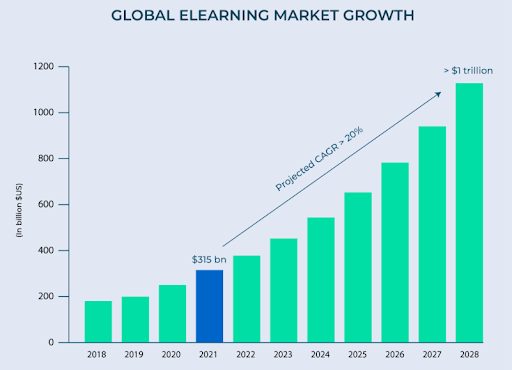
Author Bio

Dr. Franklin Valcin , an esteemed Instructional Designer and Professor at Atlantic International University (AIU), leads the charge in shaping the future of higher education with the significance of andragogy-driven adult education. With a keen focus on integrating advanced technologies and innovative methodologies, Dr. Valcin plays a pivotal role in crafting AIU’s dynamic academic programs. As part of AIU’s academic department, he spearheads initiatives to harness the power of Artificial Intelligence (AI) for personalized learning experiences. With the support and guidance of Dr. Valcin, Atlantic International University ensures that the unique and unrepeatable programs we offer meet the demands of today’s job market and anticipate the needs of tomorrow’s learners.
Exploring University Majors: A Guide to Selecting Your Path
Understanding the human skeletal system: structure, function, and significance, related posts.

Navigating University Majors: A Guide to Popular Fields of Study

Time to Act: Pioneering Sustainable Development for a Resilient 2030

AIU Receives Widespread Media Coverage for Innovative Efforts in Education and AI

Unveiling the Mind’s Window: The Remarkable Link Between Eye Movements and Cognition

Striking a Balance: Navigating Work-Life Harmony for Enhanced Wellbeing
Popular Tags

Contact Us Atlantic International University

Quick Links
Home | Spanish | Online Courses | Available Courses | Vrtual Campus | Career Center | Available Positions | Ask Career Coach | The Job Interview | Resume Writing | Accreditation | Areas of Study | Bachelor Degree Programs | Masters Degree Programs | Doctoral Degree Programs | Course & Curriculum | Human Rights | Online Library | Representations | Student Publication | Sponsors | General Information | Mission & Vision | School of Business and Economics | School of Science and Engineering | School of Social an Human Studies | Media Center | Admission Requirements | Apply Online | Tuition | Faculty & Staff | Distance Learning Overview | Student Testimonials | Frequently Asked Questions | Register for Program | Privacy Policy | FAQ


IMAGES
VIDEO
COMMENTS
6 years. If you're ready to take your existing knowledge and qualifications in Mathematics into a postgraduate research degree, Portsmouth is the perfect place to achieve your goals. Mathematics (Distance Learning) is offered at University of Portsmouth. Ph.D. / Part-time / Online. University of Portsmouth Online. Ranked top 3%.
Examples of positions you can hold with a PhD in Mathematics. The best Mathematics Online PhD programs. 1. University of Wyoming: Online PhD in Mathematics Education. 2. Bircham International University: Doctor - Mathematics. 3. The University of Wolverhampton: PhD Postgraduate research in Computing and Mathematics. 4.
Full-time distance learning Part-time distance learning; PhD: Y: Y: N: N: Attend an open day. ... The The Department of Mathematics has an outstanding research reputation. The research facilities include one of the finest libraries in the country, the John Rylands University Library. This library has recently made a very large commitment of ...
Math minor. Requires 4 courses that total at least 12 credits. Our program allows students to focus in pure or applied mathematics. You'll design a program with your faculty advisor to create a curriculum that best suits your needs and goals. If you enter the program without a prior graduate degree, you'll earn a Master's on the way to your PhD.
Fully-funded PhD Studentship in Automated Beta-emitting Radioisotope Identification and Monitoring in Boreholes. Lancaster University School of Engineering. Proposed here is the development of an automated detection and fingerprinting method using machine learning and spectra unfolding techniques for the real-time, in-situ monitoring and ...
The entry requirements for a PhD, or MPhil include an upper second class honours degree or equivalent in a relevant subject, or a master's degree in an appropriate subject. Equivalent professional experience and/or qualifications may be considered. All applicants are subject to interview.
Learn calculus, differential equations, and other topics from MIT Mathematics through the edX platform. These courses are free, but you can choose to pay for a verified certificate and earn credit at other universities.
Postsecondary Mathematical Science Teachers. $77,420. Some mathematics professionals work as analysts, actuaries, or economists, working with businesses or government entities to review figures and review outcome probability. Others pursue work as professors, researchers, or leaders within postsecondary education.
In 2019, research found that 39.8% of graduate students were enrolled in online learning. The number of doctorates awarded between 2020 and 2021 dropped by 5.4%. Not all Ph.D.-holders end up working in academia.
Look no further than our Mathematics (Distance Learning) PhD programme at Portsmouth. This postgraduate research degree offers you the opportunity to contribute to groundbreaking research in areas such as industrial mathematics and complex systems. With our world-leading expertise, you'll be equipped to tackle pressing technological ...
212-854-6729. [email protected]. For information on the department and program: Michael Harris. Director of Graduate Studies. Department of Mathematics. Columbia University. 2990 Broadway. 509 Mathematics, MC 4406.
Distance learning PhD Mathematics. 2 degrees at 1 university in the UK. NEW SEARCH. PhD Mathematics Distance learning. COURSE LOCATION UNIVERSITY CLEAR. Related subjects: PhD Mathematics; PhD General Mathematics; PhD Operational Research (OR) PhD Statistics, Probability and Operational Research ...
This online PhD in Mathematics Education is a research-focused doctorate that follows the same curriculum as its campus-based program, focusing on developing students' skills for postsecondary roles. This is a 90-hour program that can be completed in 3 to 4 years of full-time study past the student's master's degree. In addition to ...
Specializations in Mathematics Teaching, Mathematics and Statistics, and Computational Mathematics are now available at a distance. This 36-semester hour graduate program is designed for individuals with interests in mathematics, with a particular desire to teach in K-12 and community colleges, in computational math or in mathematics and ...
Teachers College, Columbia University, is the first and largest graduate school of education in the United States, and also perennially ranked among the nation's best. ... Ph.D. dissertations in mathematics education should be (1) experimental studies in learning, (2) analytical studies in policy theory in mathematics education, or (3) other ...
On average, graduate tuition and fees cost around $20,510 in 2021-2022, according to the National Center for Education Statistics (NCES). But tuition costs vary widely, with public schools averaging $12,600 per year in tuition and fees and private nonprofit institutions averaging $29,930.
2. Mathematics. Applicants to the Ph.D. in Mathematics Education are expected to have at least a master's degree in mathematics or a degree equivalent to the MS in Mathematics for Teachers (MS-MTCH) degree at Portland State University. The competency in mathematics can be met by successfully completing additional graduate-level course work in ...
Part-time and part-time distance learning: £2,393 per year; International students. Full-time students: £19,200 (may be subject to annual increase) Part-time and part-time distance learning: £9,600 (may be subject to annual increase) PhD by Publication . External candidates: £4,786. Members of staff: £ 1,950. All fees are subject to annual ...
Visit the learner help center. Earn a Master's degree from a top-ranked university at an affordable price. Study on your own schedule with 100% online degree programs and receive the same university graduate degree as students who attend class on campus.
Distance Learning PhD Degrees in Natural Sciences Mathematics The subject of mathematics is often paired up with other subjects such as education, statistics, finance, and computer science. This pairing can give added value in the teaching, computer programming, and financial forecasting and planning fields.
Mathematics by Distance Learning: January start Graduate Certificate: 1 year part-time, online, starting in academic year 2024-25 Academic year 2024-25, starting January 2025. Part-time home students: £3,800 per year Part-time international students: £6,610 per year
MATH 589 Topics in Graduate Mathematics. MATH 590 Topics in Graduate Mathematics. Computer Science. CMPS 406* Software Engineering. CMPS 410* Special Topics. CMPS 418* Artificial Intelligence and Simulation. Education/Professional Development. EDFR 503 Philosophy of American Education.
In recent years, distance learning has emerged as a powerful educational tool, offering flexibility and accessibility to learners worldwide. According to the National Center for Education Statistics (NCES), around 7.5 million U.S. students depend upon online classes for higher education. In fact, the Covid-19 pandemic has played a big role in accelerating the popularity of remote learning from ...
The cost of earning a D.N.P. depends on the individual program and your status as an in-state or out-of-state student. Tuition for the programs ranked on this page ranges between $327 and $955 per ...
Final Defense Interactions and Challenges During Synchronous Online Distance Collaborative Problem Solving Among Grade Five Students in an Advanced Mathematics Class by Mary Allaine E. Paran MS Mathematics Education Candidate Date: Saturday, 18 May 2024 Time: 11 am Venue: SEC A 321 - MJR Room Adviser: Romina Ann S. Yap, PhD Ateneo de Manila University